#Birmingham Stage Company
Text
Relatively Dangerous
AWFUL AUNTIE
Grand Theatre, Wolverhampton, Thursday 28th March, 2024
Crass comedian David Walliams has carved out a hugely successful second career as an author of children’s books. Very much in the same vein as Roald Dahl’s work, the stories often feature a decent child among grotesque adults. This one has young Stella imprisoned by Aunt Alberta, who is plotting to rob the child of her…
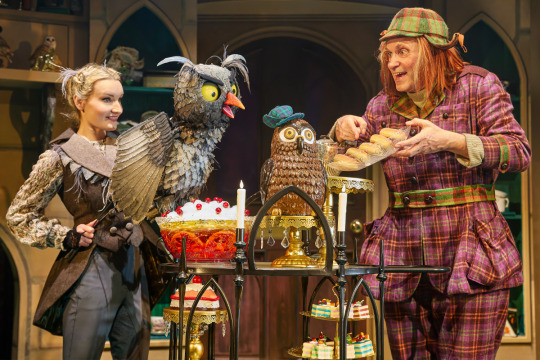
View On WordPress
#Annie Cordoni#Awful Auntie#Birmingham Stage Company#David Walliams#Emily Essery#Grand Theatre#Jacqueline Trousdale#Jak Poore#Matthew Allen#Neal Foster#review#Wolverhampton#Zain Abrahams
0 notes
Text
Little Darling I (Thomas Shelby x Reader)
Summary: Birmingham has received a new club, one that is showcasing a exotic type of dance that is drawing in crowds, but it is one particular dancer that catches Thomas Shelby's eye... one that goes by the stage name: Little Darling
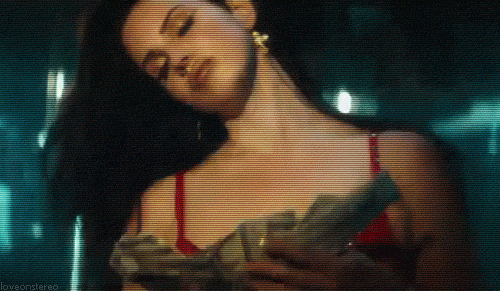
Warnings: 18+, eventual smut, stripper!reader, eventual smut, swearing, drinking, mentions of prostitution/ sex work, canon Peaky Blinders violence

😊 Dividers by @firefly-graphics 😊 Banner by @vase-of-lilies
Part II

A new club in Peaky Blinder territory was something that always raised Tommy's attention; usually, he would pay no mind when they first pop up, but it seemed like this club was different.
The Scarlet Letter was what it was called, Tommy had been sitting in his office at Shelby Company Ltd. when John and Arthur had come in to report about this club. Apparently, the club was showcasing a unique type of dance with its female employees, one that involved the use of a pole?
"A bloody pole?" Tommy had scoffed at the mention. "How the bloody hell are these women dancing with a pole?"
"Have to go check it out to see", Arthur had replied with a cheeky grin. "From what we've heard, this club had been making money. No ties to any gangs either."
It was a sight to see inside The Scarlet Letter, women adorned in expensive lingerie, their hair adorned in pinned curls and lips painted a deep red, but what was interesting was they work masks that concealed half their face. Literal poles were scattered throughout the place, a barmaid and bartender maned two bars on either side of the place, both busy; sofas and booth seats surrounded some of the poles, paritions in certain parts of the building.
He noticed a few heavy built men guarding certain areas, Tommy realizing they were hired help for the women.
"Mr. Thomas Shelby", a voice boomed. "What a surprise to be seeing the Peaky Blinders in my establishment!"

Y/N ran the red lipstick over her lips, smacking her lips together to get the the color saturated onto her lips. The eyelash extensions she had glued on for the evening tying the whole look together as she made sure to careful wipe away any excess around her mouth just as the boss came in.
"Ladies", she boomed, "We got some big customers outside. Make sure to put on your best performances!"
Cherry Johnson was their boss, she was a woman of a tall stature with a loud, booming voice that commanded respect. But she was a good boss, always fair to them and making sure they were safe, she only had them dance or perform lap dances, never forcing them to go any further.
Cherry came over to her as Y/N was about to fix the mask on, "Y/N, do you mind taking on a particular client here?"
"What client?" she asked as she adjusted the mask and tied the ribbon to secure it.
She saw Cherry grin in the mirror, "Thomas Shelby. Told him I'd send him only the best of my girls."
Everyone had heard of Thomas Shelby, of the Peaky Blinders so she looked at Cherry with a little frown, her lips curled a little.
"He's an obvious big tipper, darling", Cherry said, Y/N sighed.
"Fine", Y/N said as she adjusted her corset. "But he better know the rules."
Cherry grinned even bigger if that was even possible.
Y/N waited behind the curtain, pushing her hair behind her shoulders as she waited for her arrival to be announced. They switched dancers every hour or so, changing sets and outfits, working the floor and private dances. She noticed that her two other co-workers, Babydoll and Lovely, were up next with her on the big stage.
"Hey there, Little Darling", Lovely said with a grin. "Heard the boss gave you some big fish to entertain."
"I just hope he isn't stingy with the tips", Y/N said as she heard Cherry begin to announce them.
"Look alive, ladies", Babydoll teased, "it's showtime."

Tommy leaned back in the plush velvet chair that was in front of the large stage, Arthur and John on either side of him as he inspected the area. Cherry, the boss, had told him that she was sending one of her best girls to dance for them, the crowd favorite, but Cherry had told him the rules and the biggest one was 'no touching'.
"Next up we got Lovely, Babydoll and your favorite... Little Darling!" Cherry announced to the eager crowd.
Tommy put his cigarette between his lips as he noticed the anticipation in John and Arthur, the eagerness in their bodies; Tommy wondered where Esme thought John was as she came out, a intricate corset and stockings piece with a garter on one plush thigh adorned her body. Pinned curls framed her masked face with those blood red, plump lips and sultry, bedroom lidded eyes that were just calling to him.
He didn't even notice his brothers be captivated by her or the other two dancers as she approached the pole, a sensual dance performed in front of him as she moved in a way he had never witnessed before. He noticed other patrons throwing... pounds? at them, the women sensually grabbing the bills and stuffing them into the attire.
"C'mon Tommy", John said, grabbing his shoulders and shaking him a little. "Let loose a little already."
His brothers were throwing notes onto the stage, Little Darling making a show of grabbing them and stuffing them into the corset with a wink. She was like a seductress on the stage, moving with the music, performing acrobatic moves on the pole, it amazed him so as he light another cigarette and placed it in his mouth, he reached into his inner coat pocket, grabbing some bills into his hand.
Little Darling gave him a seductive smile, moving from the pole and getting to her knees, begin to crawl towards him till she reached the end of the stage where he was; she tilted her head a little before she leaned forward, making a show of grabbing his hand that held the bills and guiding it to stuffing the bills into the front of her corset where her tits were.
She winked at him before blowing him a kiss.

Y/N made a good amount of money from her dancing on the stage, counting the pounds that were thrown before passing it to Cherry to take her part.
"Good show out there, N/N", Cherry said, handing her back the money she earned. "You got a private dance with a Mr. Shelby."
Y/N nodded, rolling her shoulders back before making sure her makeup was still good before heading to one of the private rooms.
Walking into one of the private rooms, she saw him there; the dimly light room only seemed to work in the man's favor, adding to the feeling of danger that already existed in the room. He had his cap off, it resting on one of the side tables in the room as he blew out a smoke of nicotine from his lips.
"Cherry tells me you're called Little Darling", Tommy said as she closed the door behind her.
"I am", she answered as she slowly walked towards them.
"Quite the performance you put on."
She moved to straddle his lap, draping her arms his shoulders with a lazy grin on her face.
"I could see you enjoyed it, very much."
She stared into his piercing blue eyes, she could see the lust swirling in his eyes as she begun to move her hips.
#tommy shelby x reader#thomas shelby x reader#peaky blinders#peaky blinders x reader#peaky blinders imagine#x reader#plus sized reader#chubby reader#reader insert#thomas shelby
444 notes
·
View notes
Text
Devil, Devil - Part I


Pairing: Tommy Shelby x F! Reader
Fandom: Peaky Blinders
Summary: The seal of your fate, to a man falsely crowned. And to your devil, your soul was bound.
[Inspired by this request for a jazz/vaudevillian performer and the song Devil, Devil - MICK]
Warnings: Dark!Tommy, dubcon/noncon themes, noncon touching, little bit smutty but full smut in future chapters, stalking/unhealthy obsession, manipulation, blackmail, mentions of domestic abuse, blood, mild choking, mention of prostitution
WC: 5277

It was all because of that damned Peaky devil.
You cursed him for the gaudy pearls strung around your neck, for the corset that pinched your stomach so tight it would be a wonder if you’d be able to hit your lower notes. You cursed him for the waver in your stride every night you stepped onstage, for the heat beneath your skin when that frozen gaze seemed to douse you in fire, for the quiver in your tone when you sang – for you sang from your soul, and your soul trembled in the sights of the blue-eyed Devil.
He’d started arriving for your performances every night, attracting the attention of the dancers and the waitresses, the owner and the local hoodlums, but he paid no mind to any of them but you. He always sat in the second row, shadowed by the establishment’s collection of antiques. He’d light a cigarette and blow a halo for a crown, lurking in the darkness but staring at you from eyes like twin beacons, his pinewood throne framed by the black coat he never relinquished and his sharp features hallowed by the candlelit fires of Hell.
“He’s trouble, that one,” the locals had said. “Managed to turn a backwoods razor gang into an enterprise, but make no mistake; he’s got cursed blood in him. Shelby Company Limited, they call themselves now, but the Peaky Blinders they’ll always be. Thomas fuckin’ Shelby comes up from Birmingham, thinks he owns everything he sees. The Devil, some say; if you’ve crossed paths with him twice, them say it’s too late for you, when the Devil’s set his sights on your soul.”
If he’d truly set his sights on your soul, you wondered why he tormented you like this, why he never said a word but only devoured you with those frigid blue eyes, as if you were all his and you possessed not even a fraction of him. Last you’d checked, legend had it the Devil traded for souls, so what could he possibly think to grant you? The man had brought you nothing but misfortune. It was because of him that tonight you were expected to join the dancers, because your act had been slipping beneath that coldfire gaze and smoke-ring crown. Your manager claimed it was by popular customer request, but you knew better. You were a songbird, not a peacock; while the other girls of your troupe flared their feathered skirts and tasseled corsets, you were an instrument in their symphony. You got up on that stage not because you wanted to show off, but because when you sang, your soul came alive, and amidst the velvety sounds of the trombones and saxes and the lurid displays of flashing colours and lights, you were at peace.
Until he came along and ruined everything.
“I do not run a charity,” your manager had said. “I run a business. And this business, it has an image to maintain. Before our contract ends with this club, we need to show these Londoner pricks that we are not just another travelling circus with cheap whores and fake magic tricks. Nobody is questioning your ability to sing, Y/N. We just think you could be bringing a little… more.”
As you stepped onto the stage that night, and immediately felt yourself impaled by the icy hooks of that piercing gaze, you wondered if the Peaky devil also wanted a little “more”. As if you could give him anything more than what he’d already taken: your soul, your peace.
Your breath came shaky against the microphone as the lights illuminated the stage, blacking out all of the club’s customers except for one. One, whose mouth you could swear quirked into the slightest of smiles around his cigarette, whose gaze roved across your new ensemble like you were a piece of meat. Your corset already hitched your breath in your chest, and anger flared within you, frustration eating at the hollowness of your ribs as your voice came airy and light.
But this rage that had flickered to life inside you, warm and whelming like the oil lamps that cast darting shadows across the white tablecloths, it spurred a growl in your tone that surprised yet thrilled you, and as your nails curled around the microphone, your shoulders carried to the bright of the music, the dark of your tone made you feel like you were something dangerous. That perhaps a devil dwelled beneath your breast as it did the man with the eyes of death.
Feathered wings and headdresses whirled around you as the girls began their choreography, and your heart seemed to escape the heavy constriction of the corset to pound in your throat, your skull, joining the chorus of sounds that resonated deep in your bones. You sidled your hips from side to side, slowly, sensually, the way your dancer friend, Sally, had taught you, your heels beginning to click to the beat of the song.
But your flesh was burning up beneath that icy stare, and sweat prickled at your neck, and though you sang with fury, your voice still felt limited, unable to utilise the full breath of your stomach. Irritation clawed at your buzzing flesh, and your lip curled over your teeth as you attempted to belt your notes.
Damn you, Peaky bastard, you nearly breathed, hating the way his eyes seemed to gleam as you moved your body. He had no damn right to look so smug.
You tried to focus on channeling this frustration into the movements of your body and the snarl of your tone, the pearls along your chest clacking together as you twirled, your head growing dizzy as you battled for breath. It wasn’t the hoots and hollers nor the cat calls that spurred you on, but the icy hooks of the Devil’s gaze. No, he did not look at you like a piece of meat. He looked at you like you were a goddess.
Breaths coming shorter, you yanked at the laces of your corset, your irritation reaching new heights and the incense and music and cheer drowning out the voice in your head that usually kept you from doing anything stupid.
As your corset tumbled to the stage, cold air sweeping across your sweat-dappled flesh, your voice sprang free of its cage, notes pulled deep from your belly and your fury masking the tremble in your tone. The pearls pooled between your breasts, the feathers of the pasties still scratching your flesh but no longer grinding so painfully against the fabric of the corset.
The Blinder’s smirk seemed to fall, jaw clenched, bright eyes darkening and drinking you in between minacious glances at the men in the crowd who cheered, kicked at the tables, shouted obscene comments that were only half-drowned out by the smooth shrill of the trombones. Your lips pulled into a wicked grin round your teeth, and you became lost in the music as you danced and sang, not caring anymore that your breaths were short or that you didn’t hit every note just right. The look on his face made it all worth it.
And as the final notes died in your aching chest and the stage was swept by dark, and the saxes unleashed their final, wailing cry, Sally swept a sheer robe round your shoulders and ushered you from the stage and to the dressing room. Her excitement was contagious as blonde curls bounced over her bedazzled headband and she whispered praises to you, but her words seemed to muddle together as you heard, distinctly, the chanting of your name behind you like a sordid prayer.
---
The muffled notes of piano still hummed past the walls of the dressing room as you applied another coat of cherry red lipstick, a coil of smoke rising from the ash tray beside you and clouding your head as you attempted to filter out the excited chatter of the girls. Sheer gown now fitted properly around your arms, your skin had the chance to breathe without existing under the ogling eyes of the rambunctious men who had been chanting your name.
“I still can’t believe what just happened out there!” Sally’s voice cut through the throng of the rest, mostly because she had leaned over to squeal into your ear. “Did you see that gentleman at the front? His jaw practically dropped along with your corset.” She giggled, and you popped your painted lips, chasing away the smile that threatened their corner. You hadn’t noticed any man in that crowd but the blue-eyed Devil. Those twin blues were practically burned into your skull, so much so that –
You stilled, blood turning to ice in your veins and your heart freezing over in your chest. The lipstick clattered to the desk, causing Sally to jump back with a yelp that if not from her, could’ve only come from a Chihuahua.
Blue eyes stared back at you in the smudged mirror.
A sharp breath filled your lungs as the ice around your heart shattered and it began to beat again, hard, against your ribs, and your head spun from the sudden flood of cigarettes and incense. You could’ve feinted as you stood, whirling on your heel, nails splintering the wooden grain of the desk with how hard they dug in to ground yourself. Your gaze narrowed, and your heart fluttered as you found it was met with the same intensity.
The dressing room fell silent with a hush, and as Thomas Shelby sauntered in, snubbing out his cigarette in the nearest ash tray, a fearful reverence seemed to coagulate in the air, until it became so thick you could scarcely breathe.
A few of the girls darted out behind him as he drew closer to you, smirk playing at his lip and that darkness colliding with the bright of his eyes in a twisted, glittering dance. But he held out a hand before the rest could vanish, even the high-spirited Marla, who seemed dismayed but didn’t challenge him. Though not of a very tall stature, Thomas Shelby was an intimidating man, and it was evident that the name he carried made him untouchable. Your brow furrowed, teeth grinding together as you tried to work out exactly why he didn’t want the girls to leave when it seemed obvious he had come here for you and you alone. And when that icy gaze settled on you again, the bright of it glittering with mischief, and his smirk tugged higher with unmistakable pride and that insufferable smugness, you figured you were beginning to work it out. He wanted to make a statement, and whatever it was he planned, he wanted them to see.
The statement, perhaps, that your soul belonged to him. And only him.
Shoving his hands in the pockets of his trousers, he closed the gap between the two of you with an agonisingly slow stride, as if time revolved around him. The gold chain of his pocket watch glinted in the harsh lights, and you might’ve used the word “dashing” to describe his prim, collared, snow-white shirt, had you not wanted to smear the contents of the ash tray across it out of spite, or perhaps douse his black suit in some of the gold glitter the girls brushed their skin with.
Perhaps, some part of you wanted to print your lipstick along the rose-white flesh of his neck, to match his striking red tie.
Forcing such conflicted, intrusive thoughts from your reeling mind, you cocked your head, glaring at him expectantly.
“Quite the performance.” His voice was not shrill and grating as you had anticipated, but low, rumbling like thunder over a black horizon yet pooling like soft honey between your thighs. “Tell me, songbird, do you usually win the crowd over with such provocative displays?”
Already amazed by his sheer fucking nerve, you stifled a scoff. As if you hadn’t caught him staring, lurking in the shadows of every performance.
“You tell me, Mr. Shelby,” you purred out your words, but cocked a brow in challenge. “To what do I owe such keen interest?”
The bright of his eyes glinted, and his smirk hooked his lip. “You’ve heard of me.”
“Everyone in this city knows your name. It seems to spread like some sort of plague. I’d prefer it never have crawled from the sickening bowels of the Birmingham streets, but... here it is, on my lips.” You rolled your shoulders upward, leaning against the desk, head tilted to one side.
“And yet, you wear it well.” Thomas’ gaze darted to your parted lips, snaked his tongue between his teeth as if to taste the cherry. “Don’t fret, little bird…” He spoke in a hushed baritone that still managed to reverberate through the diminishing space between you, as if the faint hiss of his whisper would mask his words from everyone but you, like clouds gathering over distant thunder. “… you’ll be saying it more often.”
A burning, whiskey-tinged breath fanned your cheeks, stirring the wisps of hair from your face. Tension mounted in the room, the girls turning into porcelain dolls as they held their breaths, but they didn’t exist outside of the threads that pulled taut between you and the Blinder.
He smelled of gunmetal, of old books. Of charcoal and wood smoke. Like blood and hellfire.
“Will I, now? Think you own these lips, is that it? Think you own my body?” You didn’t even need to take a step to bring your figure to his, your breasts brushing his chest through the sheer fabric of your robe, the chain of his pocket watch tickling your stomach.
He smelled of earth, of sacred rituals. Of frankincense and myrrh. Like dug graves and lost religion.
And like a candle, the bright of his eyes was snuffed out by the dark, and the smirk fell from sharp outlines. “You haven’t heard?” he said. “Some say I own everything the light touches…” His fingers brushed your side, the heat of his blood beneath his skin sending cold shivers along your flesh, and you cursed yourself for wishing in that moment, in which his fingers dragged reverently down the curve of your hip, that his touch would burn away the fabric between you. “Some say I own everything the light is too fearful to touch.” The pressure of his touch increased, thumb tracing your navel, and suddenly, his grasp was anything but gentle – possessive, demanding, as his fingers curled between the parting of your thighs and his nails burned against your skin. A breath hissed from your teeth and you swatted his hand away. You were surprised when he returned his thumb to his pocket, his devious smirk reappearing. Could he hear how fast your heart was beating for him, could he smell the lust that brewed beneath your flesh, could he feel the heat that had pooled like poison between your legs?
Did he know that he haunted your dreams? That you could not drift off to sleep anymore without thinking of those soft lips trailing down your sternum, of his teeth leaving bruises across your flesh?
He made you want to be worshipped, and ruined.
“Some say you’re nothing but a Gypsy bastard.” Your voice rose, breathy and high, like a falsetto note. “A false king, with no crown.”
“But a king nonetheless.”
“A devil, the witches say. Have you come to bargain for my soul, Mr. Shelby?” Your voice dipped back into your sensual alto as you regained some vestige of control, forcing your words to rise deep from your fluttering stomach.
“Oh, I’m here for more than your soul,” he breathed, closing the sliver of a gap between the two of you again, backing your spine against the wooden desk until you could’ve sworn blood welled beneath the sheer robe. “I’m here to offer a proposal, little bird. You’re going to sing for me, at the Eden Club. I’m sure you’ve heard of it. It’s far more prestigious than this seedy place. Your pay will be tripled, and you will never know a fabric rougher than silk or taste a wine younger than a lifetime.”
Though his offer would be tempting to most anyone, you did not sing for money. Pride, it came easy to you, and you did not appreciate the condescending way in which he spoke to you, looked at you, breathed in your direction.
“I’m under contract.”
“What, this?” He chuckled, pulling the slip of paper you’d signed a year ago from the deep pocket of his trousers. The material crinkled beneath his fingers, so close you could’ve reached out and grabbed it. But you didn’t. You watched, seething, as he lowered the contract to the candle beside your lipstick, an orange tongue lapping at the corner of the ivory paper, the ink of your signature bleeding into the open flame. Out the corner of your eye, you caught a glimpse of Sally, her shoulders furling inward just as the edge of the paper did before it was swallowed by the flame, the blackened remnants of the contract smudged into the floorboards with the toe of the gang leader’s boot.
“Everyone can be bought with the right price,” he said. “Your boss’s wife, she likes diamonds.”
You shouldn’t have expected any less of your manager. Like most in the entertainment business, he was shrewd, frugal, ruled by greed. The idea of his wife wearing diamonds was laughable; Thomas must have been a bloody saint in her eyes, because the most you had ever seen that man gift her was a silver locket that had been put in lost and found at one of your past gigs. He must’ve sold you out before Thomas could even pull his mafia card. And then milked you for one last performance.
You hated them. You hated them all.
“Well, I will find new work. The crowd seems to love me,” you pointed out, recalling the jealousy you’d seen darken the Devil’s eyes as he’d watched over your performance. Butting shoulders, you moved to stalk past, but a vice grip latched round your forearm and you froze, a puff of startled air escaping your lips as your gaze swung to meet his.
“I haven’t told you my terms,” Thomas said, and if it was out of fear or that devilish itch between your legs that made your body acquiesce, you couldn’t be certain, but damn it all the same. He shoved you back against the desk, fire igniting in his icy eyes as his shoulders pressed to yours, his figure solid against your own, denoting no escape. “So long as you work for me, you will not dance for another man…” He had the courtesy, at least, of releasing those icy hooks from your soul, the sharp line of his jaw brushing a flushed cheek to let his breath pool against your neck as if whispering sweet nothings to a lover. His fingers, ghosting the pulse of your throat. A breath hissed between your teeth and your eyes flared as they dragged down the vulnerable flesh, demonstrating his strength in a squeeze at the base of your throat.
“They so much as look at you, I will personally take their eyes.” A kiss, placed to the crook of your collarbone, like a promise. His lips were as soft as you had imagined, and you half-expected his tongue to be forked like the legends, but it was supple and rounded as it wet your flesh. Your bottom lip caught in your teeth as you stifled a moan, your body betraying you in a slight rut of your hips. A chuckle rumbled against your ear; he knew what he was doing to you, and apparently the feeling was mutual, for the scarcely-clothed heat between your shivering legs brushed against a firmness in his slacks as your hips rolled forward.
“You see…” He paused to inhale your scent, to drink you down like the whiskey on his breath. “I’ve done some research… you like to move around so much because you have a husband, in Sheffield, who very much misses your company.”
The racing tides of heat that rolled beneath your flesh gave way to a cold sweat, and you shuddered, your blood turning once more to ice in your veins. Your heart, stolen from your chest, leaving your lips parted in a gasp. His fingers traced the hollow shell of your ribs, nails digging in where your heart should have been. His, you thought, wretchedly.
When he pulled back to assess your reaction, to witness the fear bloom in your eyes, the smugness was gone from his face, replaced by an intensity, a darkness that seemed to wrap its shadowy tendrils around your soul. His nose brushed yours, and you noticed, for the first time, that his face was freckled. Kisses from God, you’d heard them referred to as once, and if the breath had not been stolen from your lungs, you would’ve chuffed a laugh at the demented irony.
Dark lashes crowned the blue eyes that raked down your chest, his thumb continuing its snaking little path from your heart to the lip of your breast, slipping beneath the fabric of your robe. “A year ago, you spoke with a solicitor about his tendency to… well, overexpress his love.” A jolt rocked your body, accidentally sending your hips back against his, drawing a groan from his chest that managed to be irresistible despite the discomfort of the scar he perfectly traced with his forefinger. Pain exploded beneath the surface of your flesh, as if his fingers was made of glass, like the smashed bottle that had struck your side all those years ago. You shuddered beneath his touch, the alcohol on his breath suddenly foul, and for just a moment, the way the light reflected off his eyes betrayed a sliver of green in seemingly pure blue.
“The solicitor told me that you showed him this – this, that was not his to see. Not his to touch.” Your lashes batted beneath his furious breaths, but you dared not close them, dared not let this man turn into a ghost of your past. To your relief, his fingers retreated from your scar, only to cup your cheek in his palm. “You offered him one night in exchange for freedom, and by morning, he did not honour his word. Do you know what I did to the solicitor?”
Thighs damp with arousal, palms clammy with fear, you trembled, breaking, cracking at your seams. The splinters of the wooden desk pierced your flesh as you sought its support, feeling like your knees might buckle beneath you and somehow knowing that he would catch you, but that that would be worse than falling to the cold ground. Because he wanted you to break, wanted to be the freckled angel who caught you when you fell.
But somewhere, from the shattered remnants of your chest, festered a darkness, a thirst, a satisfaction as you imagined the bloodied face of the man who had tricked you, as you imagined his eyes turned pale, pale as death.
Your pain didn’t break you; it kept you standing, fractured but whole.
“To you, I may be the Devil, but the Devil keeps his bargains.” His thumb swept across the ghost of the kiss he’d left on your skin. “And when you work for me, I will ensure that your darling husband never bothers you again.”
You could not banish the tremble from your limbs, nor the ireful rise and fall of your chest. And when you spoke, your hate, it seemed, was not even for him but for ghosts, “You’re every bit as vile as the rumours say.”
“Oh, I’m worse.” He smiled, almost sweetly. “Much worse.” A clear-blue eye winked, before studying you so intently you wondered if he really could read your thoughts, your sordid desires. Your sins. “But I don’t see disgust in your eyes, little bird. I see intrigue.”
Breathe, you told yourself. Breathe.
You were most at ease when you sang, and in your moment of need, an old melody you’d heard once travelling west came to you, and with it, the curl of your lip into a wicked smirk.
“Cannot buy me, Devil, Devil,” you half-sang, half purred, the notes that found your voice carrying undertones so dark, it almost did not sound like your own.
And in this moment, you found power, in the way his thumb seemed to still against your jaw, in the way his eyes locked to yours, mesmerised, his tongue catching between his teeth. In this moment, at last, he was yours. In this moment, he was just a boy, lured in by a siren song. As the notes died in your throat, his eyes darted to your lips, something softer than lust forming in oceans of melted ice. Your fingers fumbled for the first drawer of the desk, stabilising yourself now on the ivory handle.
And the emotion vanished before you could make sense of it, frozen over by a wall of ice.
“In life or in death, I will take your soul.” His teeth grazed the lobe of your ear, and his hand drifted to your scalp, sinking into the wild locks of your hair. “I will take everything.” Another hand closed around your waist, squeezing your ribs, bunching the fabric of your gown. “It is your choice, little bird. Because, you see, I made certain your husband knows of your infidelity. It’s a great dishonour, to a man of his station. And what sort of things does a man of his station do when he finds himself with a problem like you, eh?” Your chin was pointed sharply up, suspended by two fingers, your lips a hairsbreadth from his own as he stared you down.
“Now, I don’t think your friends will like to see what I’m going to do to you, little bird.” A growl grated the thunder of his tone, and he bit his lip. “I’m going to be a gentleman, and let you decide if you’d like them to give us privacy.”
And gone was the whiskey of his breath, the fire of his touch, the sharpness of his teeth. Thomas Shelby took a step back, smoothing out his waistcoat as if nothing had happened between the two of you. One of the porcelain dolls came alive, skittering back on her shaky heel to make way, but he paid no mind to her. He only awaited your command, as if trying to give you some false sense of control.
The silence that stretched between you was impossibly thick, like gasoline ready to ignite from one heated breath. You remembered to breathe, in, and out. And you began to sing.
“Clever Devil, Devil…”
His eyes narrowed, fixating so intensely on you that you were convinced nothing else existed in this moment beyond your dark melody, your cherry lips, your siren song.
Trembling, behind your back your fingers pulled gently at the drawer handle.
“How quickly do they sell their souls…”
He blinked, slow, enraptured. Yours.
Your fingers clasped the familiar stock of the 1911, flesh kissed by cold metal.
“… for the feast and the promise of gold.”
Time itself fractured; Thomas barely stirred as he watched your lips, your wrathful eyes, your brow sewn by ruthless will. He did not watch the gun you pulled on him, nor did he seem to hear the rack of the slide that split the quiet of the dressing room.
“But Devil… that won’t be me.” Your velvety singing turned to words of steel in your throat, and you glared at him down the sights of your weapon. Only now, did he seem to take notice of it, with a fleeting, unconcerned glance at its gaping black maw. He could have turned it on you, but he didn’t. He just smiled, bright blue eyes shining down a silver-moon barrel to meet yours.
Stepping back, leisurely, fists buried in his pockets, he promised, “I’ll be back, to claim what’s mine.”
Your finger loosened from the trigger yet trembled as the sight of Thomas Shelby disappeared past the doorframe, nothing left of him but the soft thud of his dress shoes down the hall and the ghost of his burning touch on your skin, the dampness on your neck from the promise he’d made you. The shameful cling of the sheer robe to your slicked thighs, the cold sweat that sent shivers of winter, death, and all things barren along your flesh.
For one, gut-twisting moment, all eyes were on you. The suffocating festering of fear, the sickening crawl of disgust, the heart-wrenching trace of reproach all culminated in the air around you, cast to the incense and smoke by bright eyes and slacked jaws, crossed arms and furled shoulders.
And the girls began to scurry from the dressing room, skirts and dresses and tassels streaming behind them like streaks of lightning that followed the rumble of the storm, like rivulets of rain chased by the hurricane.
Marla was among the last to leave, her eyes wary and wild and a sneer curling her lip as her eyes traced up and down your trembling form. Only when she left did you lower your gun, sliding the hammer back in place.
That left two. Sally, and the woman who claimed herself a witch.
“I’m sorry…” you breathed, not knowing what to say. “I’m sorry you had to witness that, I – I had no idea that was going to happen.” Shifting your attention fully to your friend, you reached a tentative hand for Sally, as if to ease her anxiety. Poor thing was shaking like a furled leaf and quiet tears streaked the freckles of her heart-shaped face.
She flinched away, and your heart clenched, hand withdrawing. You set aside your gun, hoping that might settle her nerves. “At least, let me give you this back…” you untied the bedazzled choker from your neck. “It looks like this was our last performance together. Thank you, for lending me it.”
But she sprang back like a jackrabbit when the fabric brushed her knuckles, and she shook her head frantically, tears shaking free of her spidery lashes like dew falling from painted webs. “You can keep it,” she spoke, her tiny voice cracking in her chest. “Just stay away from me.”
Something bitter worked its way into the fracture of your chest, the cruel fist of rejection squeezing the remnants of your shattered heart tight. Your fist curled, hard, around the choker, so hard that when you opened it, the jewels had left red impressions on your palm, and your thanks turned to bitter ash on your tongue as the laces of the choker slipped between your fingers.
The witch, Clementine, watched you from dark eyes always shrouded in an enigma, but today, held the slight trace of unease. A foreboding weight sunk her shoulders, and when she spoke, the raspy tones of her voice were those of lost souls, crying from strangled throats to warn you of something truly grave on the horizon,
“You’re marked. You’re marked by the Devil, you are, girl.”
Your brow furrowed, and the chime of her jangling bracelets seemed to mock you like laughter as she pointed a hooked claw to your loins.
Pawing aside the fabric of your robe, your fingers swiped across the nail marks Thomas had left along your inner thigh, wrathful and red and weeping. Your fingers came away with a veneer of blood, pooling in the rings of your skin like a wax seal.
The seal of your fate, to a man falsely crowned.
And to your devil, your soul was bound.

Part II coming soon!
MASTERLIST • REQUEST
Please let me know if you would like to be added/removed to any of my taglists and notified of new works!

Taglist: @emotionalcadaver @zablife @shelbydelrey @look-at-the-soul @brummiereader @mrkdvidal1989 @fiercelittlemouse @ohwellthatslifesstuff @minaethrym
#peaky blinders#tommy shelby#thomas shelby#cillian murphy#tommy shelby x reader#cillian murphy x reader#thomas shelby x reader#tommy shelby x you#thomas shelby x you#cillian murphy x you#peaky blinders fanfiction#peaky blinders fanfic#tommy shelby x oc#thomas shelby x oc#tommy shelby imagines#peaky blinders imagine#requests#fanfiction#tommy shelby fanfic#tommy shelby smut#cillian murphy smut#thomas shelby smut#dark!tommy shelby#dark!thomas shelby#series#angst#my writing
400 notes
·
View notes
Text
Forbidden Desire (Part Eleven)
Pairing: Thomas Shelby x Reader (Female/Incestuous)
Warnings: Incest (at this stage accidental), Age Gap, PTSD, Domestic Abuse, Self-Harm, Fluff, Smut
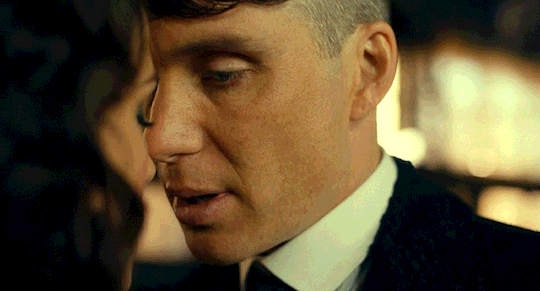
After the earth-shattering revelation that Thomas Shelby was your long-lost uncle, your world was turned upside down. The truth weighed heavily upon your shoulders, casting a dark cloud of desire and forbidden love that enveloped your every thought.
Yearning for a real father figure and a sense of belonging, you found solace in Arthur's attempts to embrace you as his own. Yet, deep within, a whirlwind of conflicting emotions tugged at your heart. The news of Arthur being your father was a bitter pill to swallow, especially as you had already fallen under the spell of Thomas. Despite the twisted nature of your newfound familial ties, an undeniable thrill coursed through your veins at the mere thought of him.
Polly, ever perceptive, was aware of your forbidden desires. In due course, she orchestrated your induction into the Shelby Family, much to your mother's displeasure. In the midst of a family gathering, you were welcomed as an equal, officially cementing your place within the Shelby clan.
Within weeks, Polly took you under her wing, unveiling the intricacies of the Shelby name. She showed you how to navigate the treacherous waters of their empire, providing you with the tools to forge your own path. In her tutelage, you learned the art of negotiation and gained the confidence to command respect from those who once stood above you. Your transformation did not go unnoticed, as your newfound assertiveness radiated like a beacon.
Linda, resentful of Arthur for allowing your rise within the Shelby Company Limited, would often remark, "You truly are a Shelby." In the bustling office, you commanded attention with your sharp wit and no-nonsense attitude. Even the other Peaky Blinders marvelled at your ability to tackle any challenge that crossed your path. Your formidable uncle, Tommy, couldn't help but be drawn to this "new you."
"I see you've settled right in, taking charge like a true fucking Shelby," Tommy proclaimed proudly upon his return from the United States, where he had forged an alliance with Al Capone.
A mischievous twinkle danced in your eyes as you replied, "Indeed, Tommy," fully aware of the captivating presence you now possessed. Tommy's gaze lingered upon you, unable to tear himself away from the magnetic force you had become.
As such, his desire for you quickly resurfaced when he returned to the office after you had last seen him three weeks ago, and this desire was now becoming stronger with each day.
Your desire for your newfound uncle, however, had never really been extinguished even though, deep down, you knew that this forbidden infatuation could never be. The more you tried to fight it, the harder it seemed to resist.
Now that he was back in Birmingham, this was going to be problematic, and you could not help but tease him, making sure that he knew that you still did not care about the fact that he was your uncle.
Thus, one day, as you were engrossed in analysing some financial documents, you became aware of a pair of intense eyes fixed upon you. Raising your gaze, you caught Thomas giving you that infamous Shelby smirk, glimmering with a mixture of admiration and something darker.
"Enjoying the view, Tommy?" you quipped, unable to resist the temptation of toying with your uncle and letting him know that you knew he was watching you. After all, power breeds confidence, and confidence tempts fate.
Thomas leaned against the door frame, his voice dripping with the perfect blend of arrogance and desire. "The view is quite remarkable indeed, but it's not the scenery that has captured my attention, Love," he mused, and the air between you crackled with an intoxicating mix of tension and attraction.
“I didn’t think it was, uncle,” you teased and little did you realise just how deeply Tommy still desired you, his thoughts consumed by the forbidden possibilities.
***
As days turned into weeks, though, the flirtation between you and your uncle escalated. The stolen glances, lingering touches, and suggestive banter left a trail of electric anticipation in the air.
However, Tommy, consumed by his position and familial responsibilities, fought tooth and nail to keep the burgeoning attraction at bay. He knew all too well the dangers of allowing desires to steer his course, especially when they involved his own flesh and blood.
Reminding yourself of the bond you shared as a family, you tried to suppress the growing feelings within you as well. This was a line that should never be crossed again, no matter how tempting it may be.
One evening, though, as the sun dipped below the Birmingham skyline, you found yourself alone with your uncle in his dimly lit office. The cogs of desire turned ceaselessly in both of your minds, threatening to break free from their self-imposed restraints.
"You know damn well what you're doing to me, don't you Love?" Tommy whispered his voice a low growl that sent shivers down your spine.
“I do, Thomas and I am enjoying it. You were the first man I have ever slept with, and I most certainly don’t have any regrets, even after finding out that we are related,” you smirked before a moment of tense silence hung heavy in the air like a thick fog, the unspoken truth lingering between you. The forbidden fruit was tantalisingly close, the taste both bitter and alluring.
“But, I respect your decision. I know how important the elections are for the company, and I also know how important you are to this family of which I am now part. So, I won’t stand in your way,” you reassured your uncle, your voice filled with a mixture of admiration and apprehension. The weight of the upcoming elections for the company and the significance of your role as a member of this esteemed family was not lost on you. You knew that your uncle's leadership was crucial, and you didn't want to impede his progress.
As he stepped closer, his presence enveloped you, and you could feel the warmth of his breath against your skin. It sent shivers down your spine, igniting a desire that surged through your veins. The intensity of your emotions was almost overwhelming, but you managed to maintain your composure.
His response was immediate, his voice dripping with an intoxicating blend of passion and confidence. "You could never stand in my way, Love," Tommy declared, his gaze locked with yours. It was as if time stood still at that moment, and you couldn't help but feel a wave of vulnerability wash over you.
A shy smile played on your lips as you absorbed his words. "No?" you whispered, your voice barely audible. Tommy's hand gently caressed your face, his touch both tender and possessive.
"No, never," he assured you, his smile radiant as he pulled away slightly. He seemed to savour the tension between you, revelling in the unspoken connection that bound you together. "I have a gift for you," he revealed, his voice filled with anticipation.
With a delicate flourish, he presented you with a beautifully wrapped parcel. The vibrant green satin dress nestled within shimmered in the soft glow of the room. Its luxurious fabric seemed to come alive, whispering promises of elegance and allure. It was a testament to the exquisite taste and attention to detail that Tommy possessed.
You couldn't help but be captivated by the dress, its beauty mirroring the complexity of your emotions. It symbolised the delicate balance between duty and desire, representing the choices you were faced with in this intricate dance of power and love.
"Before I knew that you were my niece, I had something special planned for your birthday. This no longer seems appropriate now as it involved a date at the pictures and several hours of fucking. But I wanted you to have this dress anyway, as it was custom-made for you. It should fit you perfectly, and perhaps you could wear it at your birthday party next week,” Tommy exclaimed, hearted.
The beauty of the dress filled you with conflicted emotions - gratitude, desire, and a tinge of sadness. You couldn't ignore the fact that Thomas had desired you before discovering your blood connection. It was a bittersweet gift, a reminder of the love that could never be.
***
The day of your birthday had finally arrived, and Polly spared no expense in hosting a lavish celebration for their newest member. Arrow House was adorned with twinkling lights and fragrant roses, the grandeur of the occasion evident in every glittering detail.
As you walked down the sweeping staircase adorned in the green satin dress gifted to you by your own uncle, the room fell silent. All eyes were on you, the long-lost daughter of Arthur Shelby, now officially welcomed into the Shelby Family.
The dress clung to your curves, accentuating every tantalising inch of you. Thomas, unable to resist the sight before him, felt his desire for you intensify with each step you took. It was as if the very air around him crackled with a forbidden energy.
He couldn't tear his gaze away, mesmerised by your beauty. He cursed himself for the wicked thoughts that danced through his mind, yearning to touch and taste what he knew he could never have again.
The music swirled through the room, a melody of voices and laughter, yet all Thomas could hear was the pounding of his own heart, a wild beat that threatened to expose his desires to the world.
In a quiet corner of Arrow House, beneath a veil of shadows, you mustered the courage to approach Tommy to thank him for his generous gift. The ache within you had become unbearable, the desire to kiss him consuming your every thought.
“Thank you for the dress,” you told him almost shyly as his penetrating gaze met yours, and you could see the struggle in his eyes.
“You are welcome, Love,” Tommy responded as he looked at you, desire mixed with guilt, creating a tempestuous storm within his troubled soul.
"You look stunning in it, just as I had anticipated,” he whispered, his voice tinged with need. It was a dangerous game he was playing, his words a tantalising invitation into the forbidden depths of his desires.
Lizzie Stark, who had harboured affection for Thomas for years and who was carrying his child, watched your interaction with a mix of envy and resentment. The rivalry between you and Lizzie had always existed, but now it had become intertwined with the complex tapestry of desire and blood that bound Thomas to you.
She knew about past intimacy between you and Tommy and thought that all of this was in the past now that you were part of the family.
“Lizzie is clearly still worried about you and me,” you smirked, causing Tommy to chuckle as you both noticed her eyes on you.
“Well, Lizzie has always had a dislike for women I am associating myself with, and you are clearly no exception,” Tommy acknowledged, causing you to laugh.
“But you are not associating yourself with me anymore. She, of all persons, should know that now that she reminds me of our family bond every day, referring to you as my fucking uncle,” you said with some annoyance in your voice, causing Tommy to chuckle.
“Does she now?” Tommy chuckled, causing you to nod.
“Yes, Uncle Tommy. She does. And perhaps you should have a word with her about it and tell her to stop being so pitiful,” you told Tommy before you beckoned him with a mischievous smile.
“Now come, I need to show you something,” you then told your uncle before leading him upstairs to one of the guestrooms in Arrow House, and as Tommy followed you silently, desire burned hot between you, pulsating with a fierce urgency.
“Show me what, Love?” Tommy ought to enquire as, confidently, you pulled him into the empty room before, in the dimly lit corner, you pressed your lips against his with a passionate fervour, your hands exploring his body with a mixture of longing and desperation.
It was a kiss laden with desperation, a passionate struggle against the convictions that threatened to tear you apart. For a fleeting moment, nothing else mattered, and the world outside that room ceased to exist.
But just as quickly as it had begun, Thomas pulled away, his face a maelstrom of regret and self-reproach. "No," he said, his voice ragged and filled with torment.
His grip on your shoulders tightened as he tried to find the words. "Y/N, I am your fucking uncle,” he said, his voice thick with anguish. It was a reminder that echoed through your mind, a harsh reality that threatened to shatter the fragile illusion of forbidden love.
“Yes, I know, but it is also my birthday, and I am already drunk on the champagne,” you told him, realising once again how much you still loved him as, in your eyes, disappointment mingled with frustration.
Thomas looked torn, his resolve waning under the weight of his desires. But his sense of duty fought fiercely against the raw passion that had entwined your souls. It was a battle for his moral compass, and he knew it would forever change the dynamic of the family if he surrendered to temptation.
"I can't Love. It's not just about us. It's about my fucking reputation, the elections, and everything that holds our family together, and you fucking know that, don’t you, eh" he repeated again, using the same words that he used on you two weeks ago. His voice was heavy with self-restraint. His eyes bore into yours, an unspoken promise of love and longing, even as he denied himself the pleasure of surrendering.
The corner was filled with unspoken words, thick with regret and longing. The world faded away, leaving only the two of you caught in a web of desire and familial ties. The room buzzed with excitement, oblivious to the intricate dance of passion being performed in that secluded space.
Frustration coiled within you, growing with each passing second. The truth of your blood connection was like a spectre haunting your every thought. The intensity and complexity of your feelings made it difficult to see beyond the throbbing ache in your heart.
Thomas abruptly stepped back, creating distance between you as he battled conflicting emotions. He turned away, his jaw clenching with determination. "I'm sorry. I should've never allowed it to go this far," he said, his voice heavy with self-loathing, not even realising that you both were being watched.
Without another word, Thomas walked away, leaving you standing there, trembling with a potent mix of desire, frustration, and heartbreak. He walked toward the door, his footsteps weighted with regret.
As he turned the doorknob, you couldn't hold back the desperation in your voice. "Thomas, please... don't leave me here. Not like this, on my fucking birthday,” you begged, and Thomas froze at the threshold, his resolve wavering for a precious moment. His eyes were lost in a tempest of conflicting emotions. But then, with a final sigh, he stepped out into the dimly lit hallway, leaving you alone in the room, your heart shattered.
Tears streamed down your face as you collapsed onto the bed, the weight of the forbidden desire crushing you. You wondered if you could ever find a way to navigate this treacherous path, one that defied both morality and convention.
Unbeknownst to you, as you lay broken and defeated, Thomas stood at the end of the hallway. His fists clenched, his features twisted in anguish. The battle within him waged on, torn between the love he knew was wrong and the restraint he knew was correct.
Lying there, adrift in a sea of despair, you wondered how it had come to this. How had fate forged such an intricate web, weaving together desire, longing, and the damning truth of your shared blood?
You felt like you had been short-changed by life, and after wiping away your tears, you, too, put on a solid face to return to the party downstairs.
Lizzie Stark, her eyes filled with triumph and pity, brushed past you on your way down to the ballroom, her voice barely concealing her smug satisfaction. "Tommy will never truly be yours. Blood is thicker than desire,” she barked, and you resisted the urge to confront Lizzie, unable to find the words to refute her taunts.
The weight of Thomas's rejection bore down on you, suffocating your spirit and casting a dark cloud over the extravagant celebration that had once held so much promise.
As you meandered through the festivities, your mind raced with thoughts of escape. Perhaps leaving Birmingham was the only way to mend your shattered heart. But even as you entertained the notion, a part of you clung to the hope that maybe, just maybe, love could conquer all in the end until, somewhat suddenly, you were approached by a man you had not met before. His name was Liam O’Connor, and he was the newest member of the Peaky Blinders. Handsome, tall and dangerous.
#cillian murphy#cillian murphy smut#cillian murphy imagine#cillian murphy x reader#cillian murphy x y/n#tommy shelby#cillian murphy x you#peaky blinders#tommy shelby smut#tommy shelby x reader#thomas shelby smut#thomas shelby x reader#thomas shelby fanfic#thomas shelby imagine#thomas shelby#peaky blinders fanfic#peaky blinder fanfic
450 notes
·
View notes
Text
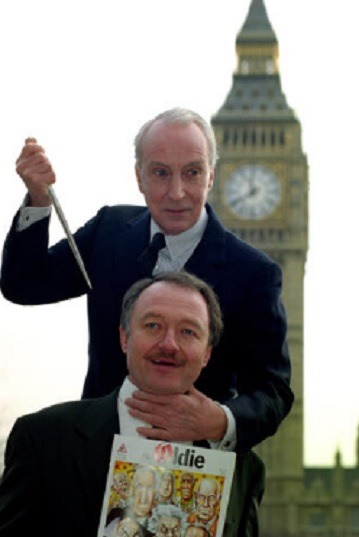
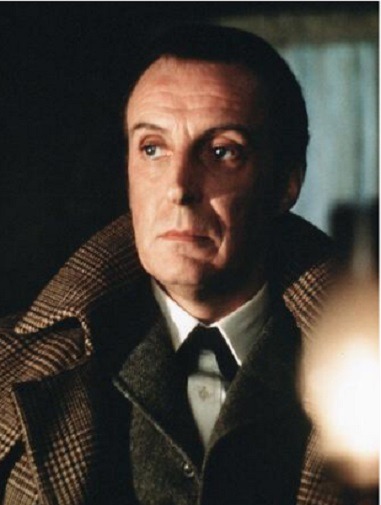

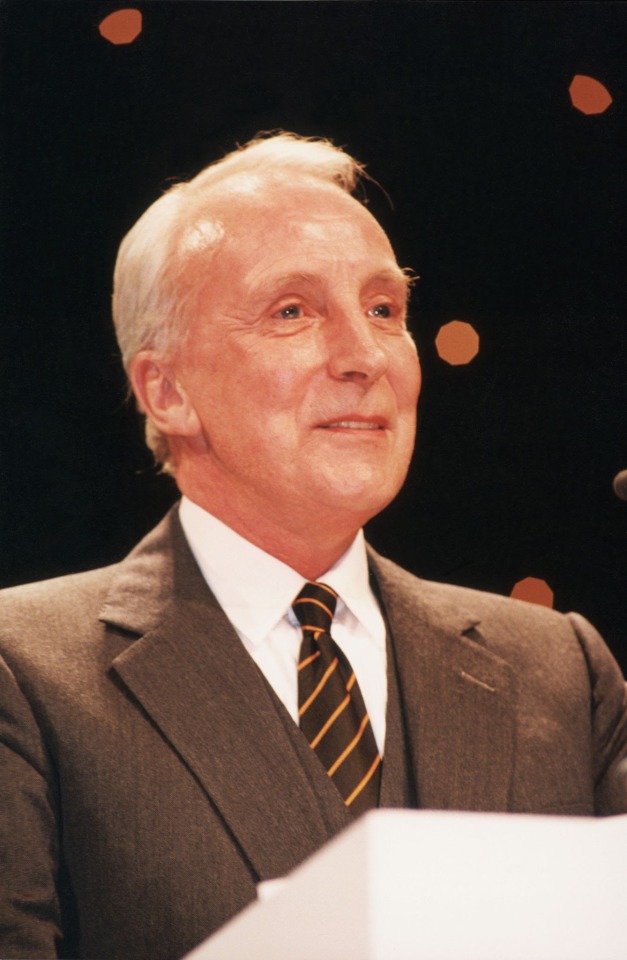
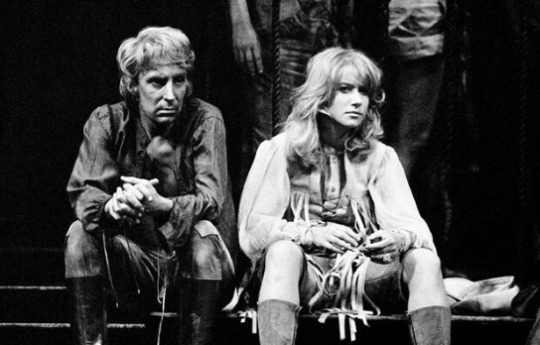
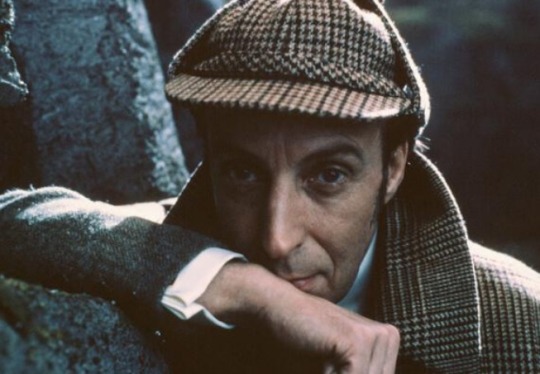
On April 7th 1934 Ian Richardson was born.
A great classical actor, he was best known to TV viewers as the Machiavellian Urquhart in House of Cards, in his golden years at the Royal Shakespeare Company from 1960 to 1975, he played a long line of leading roles, television and film later brought Richardson wider renown.
Born as Ian William Richardson the only son and eldest of three children of Margaret and John Richardson in Edinburgh, Ian was educated at Balgreen and then Tynecastle schools, he thentrained for the stage at Glasgow’s College of Dramatic Art, with lightning speed, Richardson, at the age of 24, found himself playing Hamlet. Two seasons at Birmingham were followed by a swift transfer in 1960 to neighbouring Stratford where Richardson became a vital component. of the Royal Shakespeare Company where we was one of the founders.
After leaving the RSC, Richardson became a somewhat nomadic figure, turning up on Broadway as Higgins in My Fair Lady.
For a while he was on the dole — one morning he was even scrabbling round Covent Garden collecting fruit and vegetables. He also suffered a nervous breakdown, as a result of which he was sent to a nursing home run by nuns in Regent’s Park; after three weeks’ treatment he had recovered sufficiently to return home. I suppose it was his time unemployed that took him into a more regular career on the small screen.
From the late 1970′s onwards, he carved out a prosperous career in TV and film. Of course he had already made many TV appearances before now but audiences were peaking just at the right time for the wider public to appreciate his acting skills.
Tinker Tailor Soldier Spy, Private Schultz, Porterhouse Blue were the type of programmes I was watching Richardson in, he also played Sherlock Holmes and Dr Joseph Bell in shows about the detective. Then of course there was House of Cards and the brilliant portrayal of the anti-hero Francis Urquhart. He won the BAFTA Best Television Actor and nominations for the following two series.
In June 2006, he was made an honorary Doctor of the University of Stirling. The honour was conferred on him by the University’s Chancellor, fellow actor Dame Diana Rigg.
His final film appearance was as Judge Langlois in Becoming Jane, released shortly after his death.
During the last 15 years of his life he appeared five times on television acting opposite his son Miles Richardson, though this was usually with one or the other in a minor role
17 notes
·
View notes
Text
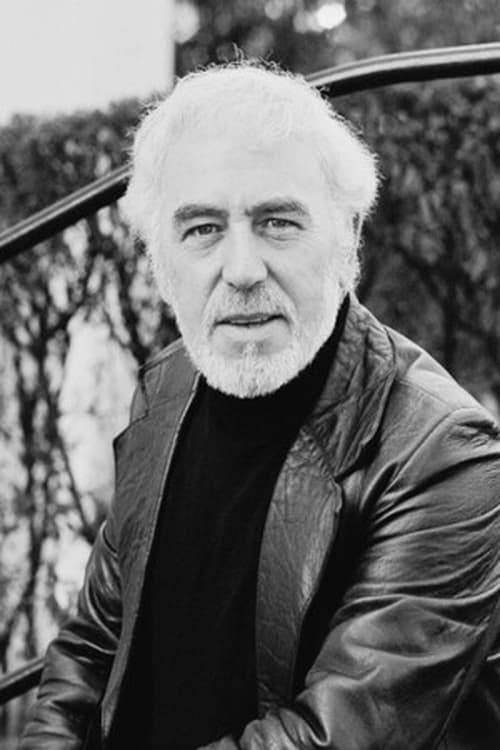
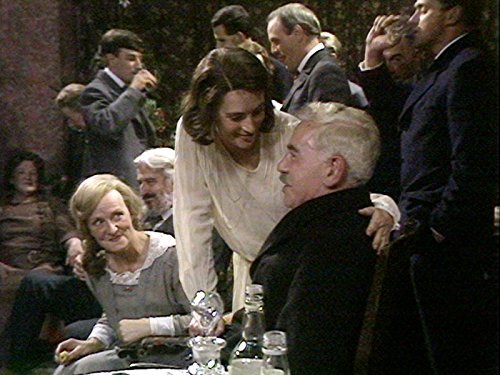
This is another in our occasional series featuring luminaries of stage and screen with a strong personal and/or professional connection with Northeast England, inspired with thanks by @robbielewis. The most recent previous instalment was on brother and sister acting duo Malcolm and Catherine Terris. This time, James Garbutt.
As with some of our previous subjects, there is an unsatisfying lack of biographical information available; James Garbutt seems to have built a solid career over decades without a high public or media profile.
He was born in Houghton-le-Spring, County Durham, in 1925. In World War Two he was an RAF pilot serving in Africa, subsequently worked as an art teacher and became a leading member of the socialist theatre company, Newcastle People’s Theatre, throughout the 1950s and 60s.
He was active in British television between 1969 and 2002, with his breakthrough role in the 1970s BBC blockbuster, The Onedin Line, replacing Brian Rawlinson for season three (only) as Robert Onedin. (It appears that Rawlinson did not want to continue in the role, but for whatever reason returned for season four and remained until they eventually killed off the character).
James Garbutt is perhaps best remembered for his intense performance as Bill Seaton, the prickly patriarch of the Seaton family and veteran pitman who is paralysed in an underground accident, in 39 episodes of the Tyneside social realism drama, When the Boat Comes In (1976-77).
Amongst over 60 recorded screen credits, his other television appearances include three episodes of Doctor Who (Genesis of the Daleks, 1975), Z Cars, Whatever Happened to the Likely Lads, Middlemarch, The Bill, the political drama Bill Brand, and three separate characters over eight episodes of Coronation Street between 1970 and 1997. He also appeared in the Superman: The Movie (1978), starring Christopher Reeve.
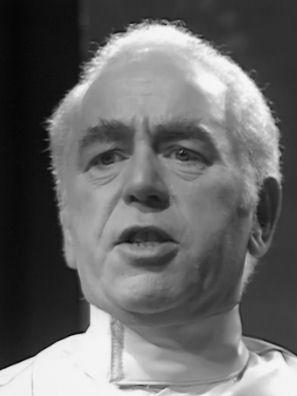
About to bite the dust courtesy of the Daleks in Doctor Who
In addition to his work for the Newcastle People’s Theatre, his stage appearances include several productions for the Royal Shakespeare Company, including the stage version of Our Friends in the North which preceded the hit televisions series, for the Leeds Theatre Trust, Alexandra Theatre (Birmingham) and Tyneside Theatre Company.
He passed away in 2020, aged 94.
#social history#uk politics#working class history#social justice#british culture#british actors#british theatre#british television#northeast england#geordie#county durham#doctor who#coronation street#when the boat comes in#the onedin line
10 notes
·
View notes
Text
In October, Melissa began an in vitro fertilization cycle. A resident of Birmingham, Alabama, her fertility journey to that point had been not just difficult, but harrowing—earlier that year, she had nearly bled to death during a procedure to resolve a second-trimester miscarriage. When the IVF process yielded just a single viable embryo, she had it frozen, and a few months later started another cycle. “It’s very easy to lose an embryo,” she says. “This is such a delicate process.”
Melissa has a daughter, born when she was younger, but IVF represents her best and last chance to grow her family. After the Alabama Supreme Court ruled last week that embryos are children, all of that is now on hold.
WIRED spoke with three women directly affected by the Alabama Supreme Court’s February 16 ruling, which stated that embryos are “unborn children … without exception based on developmental stage, physical location, or any other ancillary characteristics.” Fearing legal liability given the broad scope of the language, several of the state’s most prominent IVF providers—including the University of Alabama at Birmingham, Alabama Fertility, and the Center for Reproductive Medicine at Mobile Infirmary—have paused treatments. That means patients like Melissa, who is going by a pseudonym given the sensitivity of the topic, are stuck in limbo, and in some cases running out of options.
“I’m rapidly losing time,” says Melissa. The 37-year-old has an autoimmune disorder that she needs to plan IVF cycles around; her ovarian reserves are low enough that her doctors say she has a window of a month, maybe two, to try again. If the ruling holds for much longer, she may not have another chance.
During IVF, patients take hormone-stimulating medications to trigger their ovaries to release mature eggs. The eggs are then retrieved with a small needle and fertilized with sperm in a lab to form embryos. Sometimes a successful IVF cycle can result in several embryos, but doctors typically transfer just one or two into the uterus at a time. Success isn’t promised; about one in three embryo transfers results in pregnancy.
That makes Melissa’s situation especially urgent. There’s no guarantee that her one embryo will result in a birth. But the ruling has disrupted the lives of women at every stage of treatment.
Lochrane Chase started IVF in August, after nearly a year of trying to get pregnant and using less intrusive fertility treatments, such as ovarian stimulation. The 36-year-old Birmingham native was able to freeze and store over two dozen embryos, of which several appeared viable after genetic screening. An embryo transfer in October resulted in a pregnancy, but Lochrane miscarried a few days later. “It was the saddest I’ve ever been in my life,” she says. She tried again in December; again, she miscarried.
Before another scheduled transfer in January, her doctor noticed fluid in her uterine lining; Lochrane underwent surgery in mid-February to address the issue, and scheduled another embryo transfer for March 18. Despite the uncertainty caused by the ruling, she has started taking the necessary hormones anyway in hopes that the situation resolves by then. If not, the medications would have been for nothing, and she’ll be left with no way forward.
That’s due in part to the severity of the new restrictions on embryos in Alabama. Both Melissa and Lochrane looked into getting treatment out of state as soon as the ruling came down, but quickly found that was an unworkable solution. Companies that transport embryos have paused shipping out of the state while assessing the legal risks associated with the ruling. In a statement emailed to WIRED, a representative from the University of Alabama at Birmingham said the health system is working to identify a company that is willing and able to transport their embryos to another facility as soon as possible: “It is our goal to help patients who are interested in this option do so safely, but—at this time—there are no options available.”
Even if patients could transport their embryos, IVF treatment often requires close proximity with the health care provider, making it infeasible for many.
“You have to do blood work every three days. You have to do ultrasounds. To travel to go do that, it’s almost impossible,” says Melissa. Within 24 hours of finding out that her treatment would be affected, Lochrane had made contact with clinics in Boston, Atlanta, and Winston-Salem, North Carolina—conversations that ended when embryo transportation shut down.
The impact is one of lost time and opportunity, but also of cost. Lochrane says she and her husband have spent $50,000 on fertility treatments so far. Each transfer costs $3,500; each round of medication another $500 or so. For Paula, a 38-year-old Birmingham resident, the bulk of her expenses are carried by Progyny, a fertility insurance company that she has access to through her husband’s job.
Paula, who also asked to use a pseudonym, has already undergone one embryo transfer, in April of last year. It resulted in a miscarriage. She now has three frozen embryos left, and had gotten authorization from Progyny earlier this year to attempt another transfer. That authorization has a three-month window, which expires on March 28. “The concern is, if we don’t do it before March 28, will our insurance do another authorization for us, because we live in Alabama?” she says. “It’s been very stressful. My blood pressure has been through the roof.”
In an emailed statement to WIRED, Progyny CEO Pete Anevski said that health care providers “can shift the authorization as needed,” and that the company “will continue to support its member patients and its network providers in Alabama.”
That support can only go so far, though, as long as the Alabama Supreme Court ruling persists. While all three women have frozen embryos, even that practice may be at risk. One of the many uncertainties of the ruling is whether freezing of embryos will be able to continue. “The cryopreservation of fertilized eggs is an essential component of infertility care at this point, and that whole enterprise is very much threatened,” says Sean Tipton, chief advocacy and policy officer at the American Society for Reproductive Medicine, a professional organization that represents fertility specialists. Using frozen embryos for IVF is not only safe but has a higher success rate than fresh embryos.
It’s also unclear how the ruling will impact the egg retrieval process. About five to six days after fertilization, an early-stage embryo, called a blastocyst, forms. But not every fertilized egg goes on to develop into an embryo. This happens naturally, as well as in IVF labs. Under the Alabama ruling, this scenario could also open up a clinic to a potential lawsuit. “With this legal ruling, the question is, if an embryo fails to develop, will these health care providers be found liable for wrongful death or murder or manslaughter?” says Betsy Campbell, chief engagement officer at Resolve, an infertility nonprofit association based in McLean, Virginia.
In a Facebook post, Alabama Fertility Specialists said it is putting new IVF treatments on hold “due to the legal risk to our clinic and our embryologists,” and is contacting affected patients.
In a statement emailed to WIRED, the University of Alabama at Birmingham said its Division of Reproductive Endocrinology and Infertility is pausing egg fertilization and embryo development because of “the potential that our patients and our physicians could be prosecuted criminally or face punitive damages for following the standard of care for IVF treatments.”
The patients whom WIRED spoke with all shared a sense of crushing uncertainty and anger.
“People don’t understand that when you’re put in a position to make decisions like [IVF treatment], you don’t make it lightly,” says Melissa. “That it sticks with you forever. That it changes you. To have laws that prevent you from making decisions that—as gut-wrenching as they are, as hard as they are—that you can’t make them for the health of your family, it’s an indescribable feeling.”
Even Lochrane, a lifelong Alabama resident, says that the ruling has made her seriously consider leaving. “I feel so powerless in this state,” she says. Lochrane is on the board of local nonprofits, serves as a deacon in her church, and is deeply involved with numerous civic organizations. Her family is here, as are her friends. Still, she says, the last week has dramatically shifted her perspective. “If I could move to Boston and have an opportunity to have a family there but not in Birmingham,” she says, “I would be at the airport now.”
IVF providers, patients, and advocates are hoping that the Alabama legislature could allow IVF to continue in the state. Last week, Alabama House minority leader Anthony Daniels, a Democrat, introduced a bill that would establish that a “fertilized human egg or human embryo that exists outside of a human uterus is not considered an unborn child or human being” under state law. Republican lawmakers are also expected to introduce similar legislation soon.
“We’re hopeful that there will be a legislative fix,” Campbell says. How long that fix takes, though, will have life-altering consequences for many Alabama IVF patients. And if it doesn’t materialize, most will be left with no options at all.
“We have healthy embryos,” says Lochrane. “We just want to be able to have children.”
17 notes
·
View notes
Text
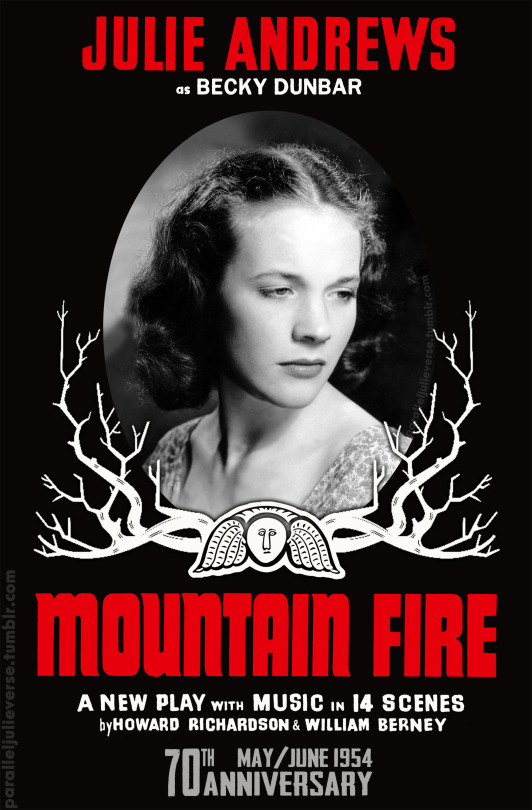
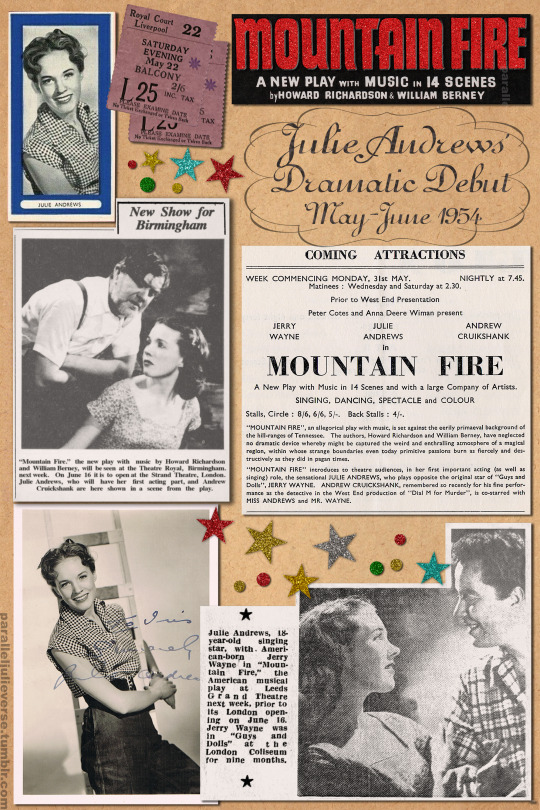
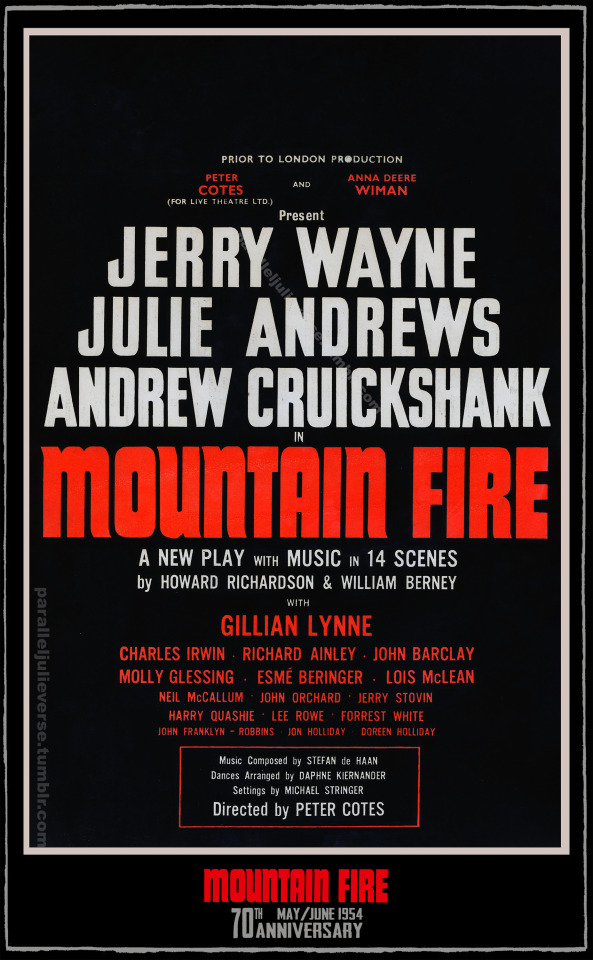
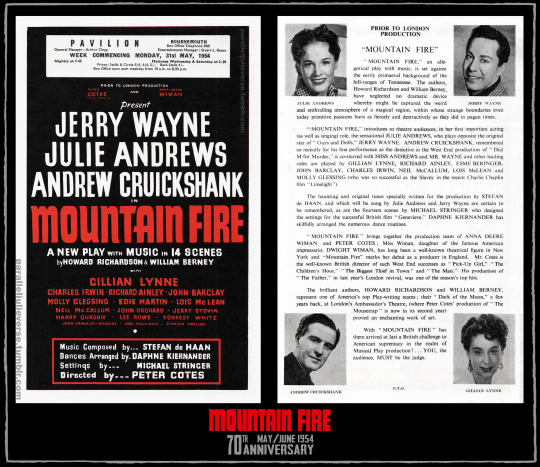
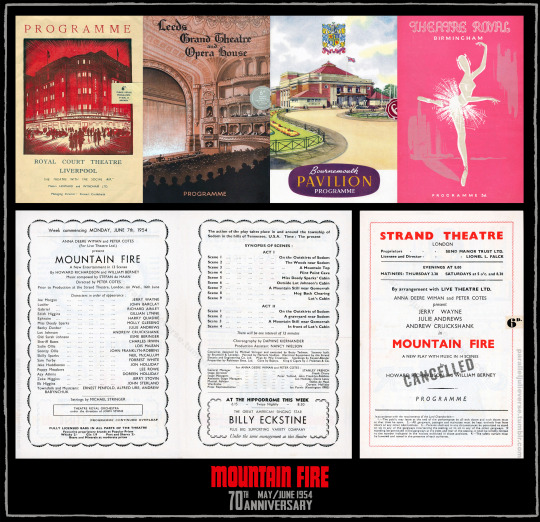
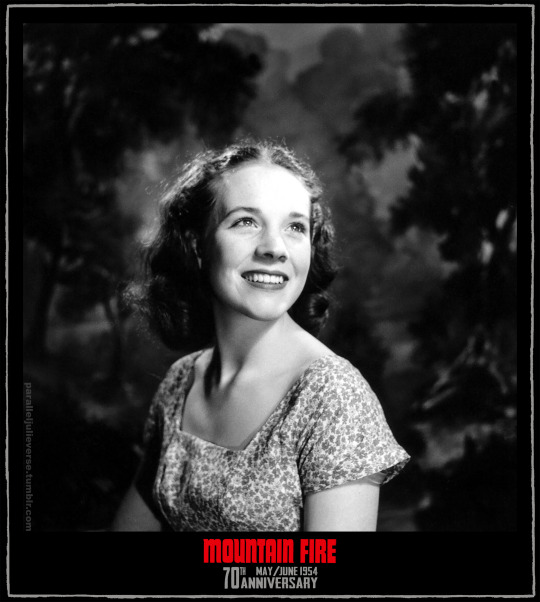
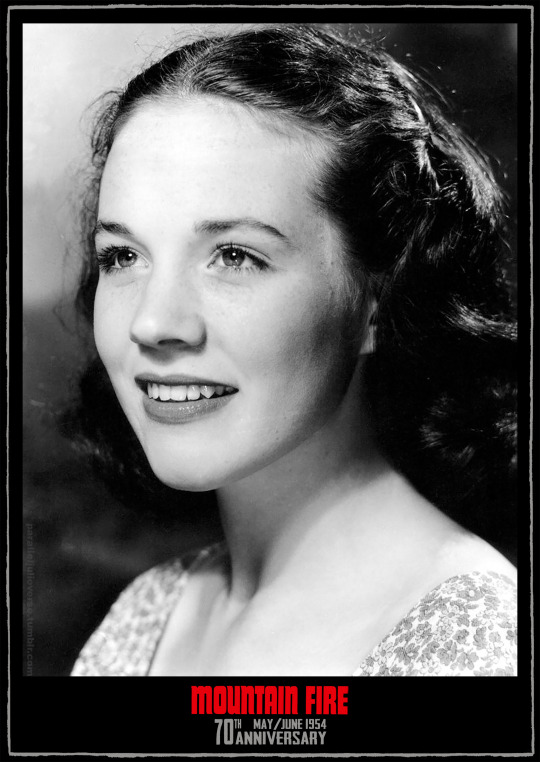
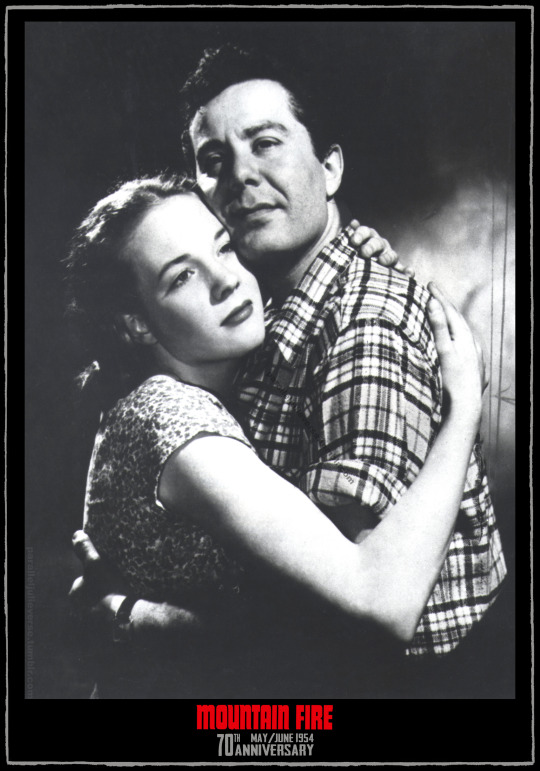
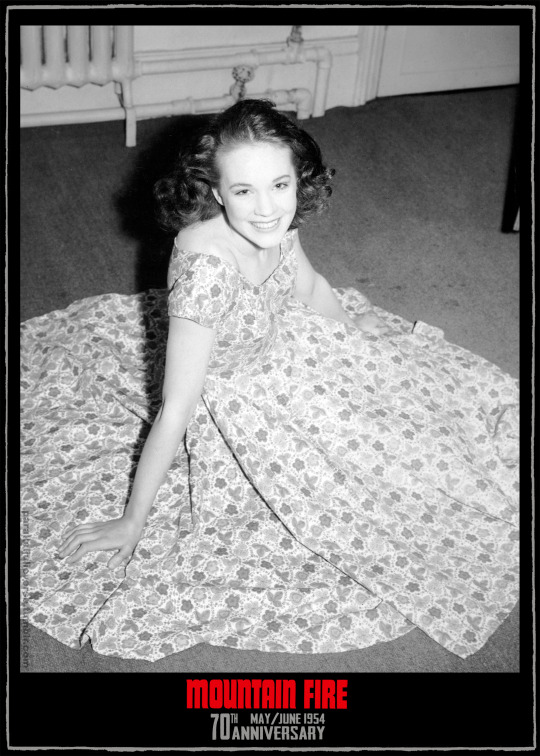
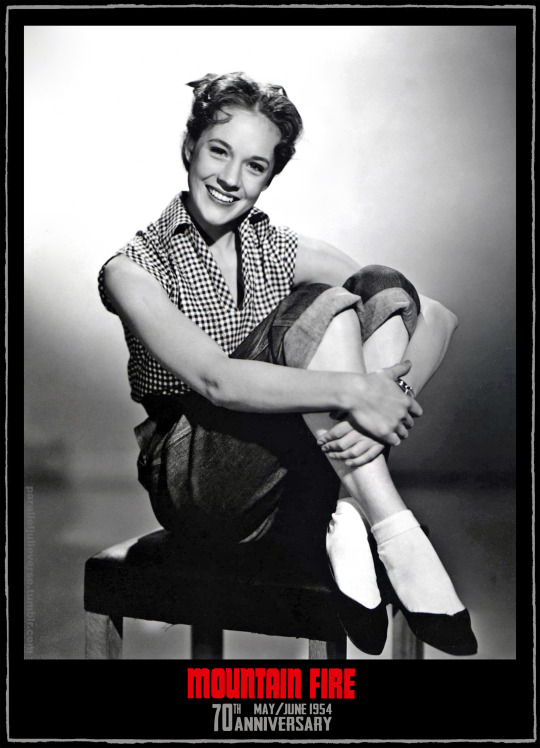
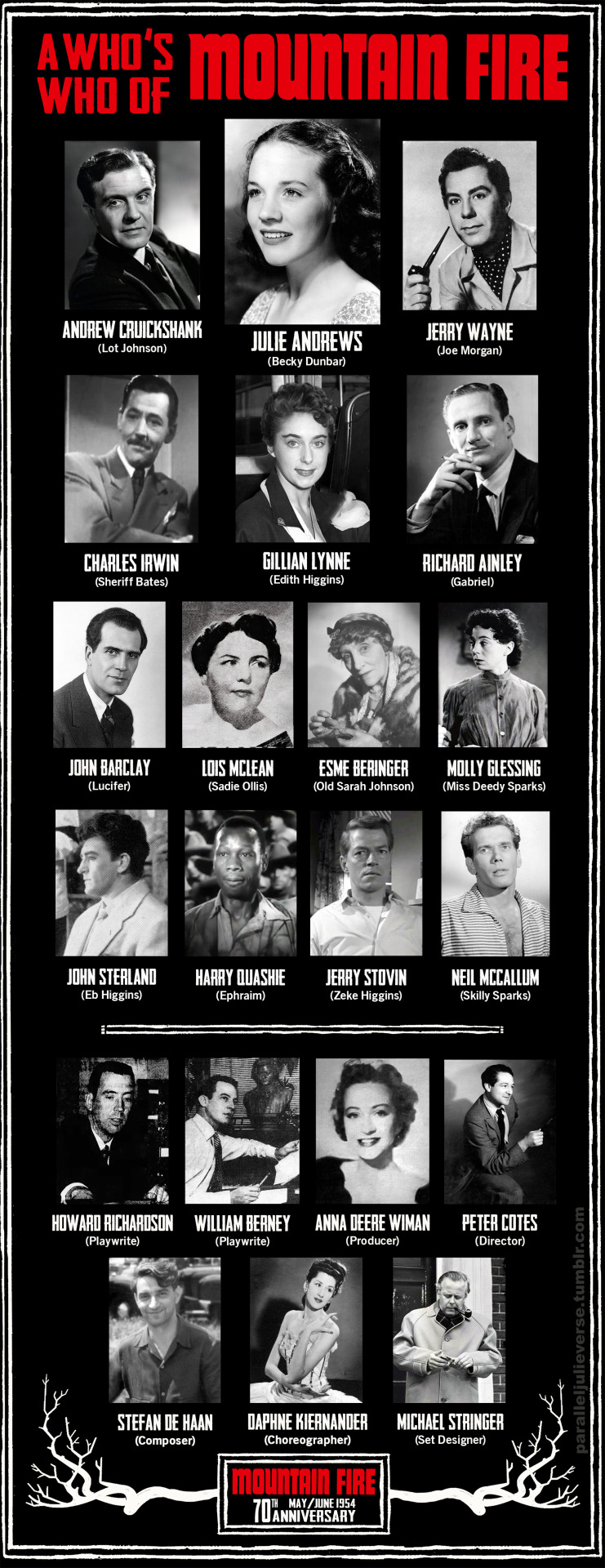
70th anniversary of Mountain Fire
Liverpool / Leeds / Bournemouth / Birmingham
30 performances
(18 May 1954 - 12 June 1954)
This month marks the 70th anniversary of a significant, if curious, milestone in the early career of Julie Andrews: her 'straight' theatrical debut in Richardson and Berney's Mountain Fire.
A notorious flop, Mountain Fire lasted barely 30 performances in a month-long provincial tryout, closing ahead of a planned West End bow. The play would likely have sunk without a trace were it not for the fact that its female lead was on the cusp of international stardom.
While the ill-fated Mountain Fire was on the road, it was formally announced that Julie Andrews had been signed to helm the Broadway cast of The Boy Friend (Chit Chat 1954, p. 8; Mackenzie 1954, p. 4). The stark contrast between the disastrous failure of Mountain Fire and the star-making success of The Boy Friend has become part of the mythology of Julie Andrews' career.
Even the Dame herself is fond of playing up the angle. "I had done one bomb in England," she recounts in a 1966 interview, "an incredible disaster...between Cinderella and The Boy Friend. I accepted a very limited engagement, thank God, and played a Southern belle from Tennessee...I can't tell you what went on. It was a disaster" (Newquist 1966, p. 141).
Four decades later in her 2008 memoirs, Julie was still cringing over the experience:
"The truth was, the play was not good, and although the company tried to make it work, we all sensed it was going to be a flop. I also knew beyond a shadow of a doubt that had the eminent London critic Kenneth Tynan seen my performance, it would have been the end of any career I hoped to have. Mercifully, Mountain Fire folded out of town" (Andrews 2008, 160).
Legitimate, at last!
Self-deprecatory humour aside, Julie actually received very good notices for her efforts in Mountain Fire. The Stage declared: "Julie Andrews scores a particularly fine dramatic success in her first serious portrayal, as the ill-starred Becky, bringing rare maturity to the difficult and exacting role" ('American folk play' 1954, p. 10). The Liverpool Echo similarly enthused: "Julie Andrews scores a personal triumph as the young girl and, in her first 'straight' role, reveals herself as accomplished an actress as she is a singer" (H.R.W. 1954, p. 5). While the Yorkshire Evening Post opined: "Julie Andrews gives a beautiful and moving performance as the luckless Becky" (Bradbury 1954, p. 8).
Though the production might not have panned out as anticipated, Mountain Fire was a strategic step in Julie's ongoing pivot from child stardom to adult performer. Much was made in show publicity about Julie’s "graduation" from juvenile entertainment to mature dramatic fare:
"Brilliant stage and film children are always a little heartbreaking. So few of them amount to anything after they have reached the colt stage...One of the most happy exceptions is Julie Andrews--the once plain little girl with buck teeth, a slight squint and pigtails who astonished us all by singing operatic numbers in a sweet, clear coloratura when she had reached the ripe age of 12...Now, Julie is to make her debut as a straight actress in a new American play to be presented here by Peter Cotes...called Mountain Fire...Cotes says: 'Julie has a wonderful role and I believe her to be a young actress with great possibilities.'...[A]s she has both singing and dancing to do in her first straight play, this might well be the chance of a lifetime for grown-up Miss Andrews" (Frank 1954, 6).
'A hill-billy Bible story'
Mountain Fire couldn't have represented a more "grown-up" change for Julie. Billed as a "new play with music in 14 scenes", it was the latest offering from rising American playwrights -- and cousins -- Howard Richardson and William Berney. The pair had scored an early success with Dark of the Moon (1945), a fantasy verse play about witchcraft, love, and social intolerance in colonial-era Appalachia. They followed with a second collaboration, Design for a Stained Glass Window (1949) about religious persecution and martyrdom (Duncan 1966, p. S-7; Fisher 2021, p. 248-49).
Mountain Fire trod similarly heavy dramatic ground with a mix of religion, Southern Gothic stylings, and social commentary. Described by one critic as "a hill-billy Bible story", the play was an allegorical retelling of the Abrahamic legend of Sodom and Gomorrah with the "cities of the plains" transposed to "rival colonies of mountain dwellers" in the backwoods of eastern Tennessee (Mackenzie 1954, p. 4).
The scriptural elements of human wickedness and divine retribution were adapted into a laundry-list of stock Southern vices: a Hatfield-McCoy style feud, moonshine, teen pregnancy, arson, murder and, even, a Ku-Klux-Klan lynching ('New American Musical' 1954, p. 12). Punctuating this cavalcade of backwoods iniquity was a series of Greek choric tableaux where Lucifer and the Archangel Gabriel, dressed in mountainfolk mufti, debate the spiritual problems of the characters on stage.
At the heart of this heady mix, Julie was cast in the "Lot's wife" role of Becky Dunbar, a winsome but headstrong teenage mountain girl described in the script as "grow'd up wild as onion weed" (Richardson and Berney, 1954, Act 1, Scene 2, n.p.). Becky finds herself pregnant after a brief dalliance with Joe Morgan, a charming but unscrupulous travelling salesman. She is torn between her passion for Joe and her moral duty to Lot Johnson, a virtuous widower who marries her because "it's the Christian thing to do" (Richardson and Berney, 1954, Act 1, Scene 5, n.p.).
Julie often jokes that "You've never heard a worse Southern accent than mine" (Newquist 1966, p. 141) -- and the script's hillbilly argot certainly would have proved a challenge to her crisp Home Counties consonants and rounded vowels. Becky's very first line, for example, is: "I ain't been gallivantin', just skimmin' rocks at Turkey Creek" (Richardson and Berney, 1954, Act 1, Scene 2, n.p.). Not exactly typical RP phraseology!
On a less challenging note, the show also featured a series of musical interludes with ritual dances and allegorical songs. Sporting titles like "Lullaby to an Unborn Child", "The World is Wide" and "Oh, It's Dark in the Grave", the musical numbers may not have been cheery toe-tapping ditties, but reviewers typically singled out Julie's singing as an all-too-rare highlight.
"Julie Andrews..prov[es] her undisputed musicianship by taking one song on high E flat, solus, and in perfect tune," marvelled one reviewer (Bradbury, 1954, p. 8). Another chimed: "We are inclined to think poorly of Becky until we realise how well she is to be played by Julie Andrews...Sodom and Gomorrah...seem to sweeten because of her presence... and she sings very pleasantly on the few occasions afforded to her" ('Midland entertainments,' 1954, p. 17).
Given the Biblical source material, the story of Mountain Fire could only end in grand tragedy. And, lo, by play's end the backcountry villages have been consumed by fire and our poor Julie is turned to salt. If naught else, the last scene of Mountain Fire certainly gave Julie a scenery-chewing finale for her straight dramatic debut:
LOT (Offstage): Remember the warning, Becky! Don't look back!
The hoot of the owl is heard.
BECKY starts up the hill. She stops, hesitates, almost looks back. Music builds. Again she goes forward, stops, almost looks back. Music continues to build. The third time she turns and does look back. Music crescendo. The lights dim, then rise again.
BECKY has become salt. She lies motionless reaching towards JOE.
Blackout
CURTAIN
(Richardson and Berney, 1954, Act 1, Scene 2, n.p.)
From Sodom, Tennessee to the Scepter'd Isle
The background saga of bringing Mountain Fire to the stage was almost as feverish as the storyline. The play began life in 1950 when Richardson and Berney completed their first working script under the original title of Sodom, Tennessee.
The play was initially optioned by Jack Segasture, a 23-year-old would-be Broadway producer who had managed Richardson and Berney's previous work, Design for a Stained Glass Window. That production proved a misfire, closing after just 8 performances, but Segasture was keen to back the playwrights for a second attempt at Broadway success (Watt, 1950, p. 47).
In the summer of 1950, Segasture mounted a series of workshops of Sodom, Tennessee at various regional Pennyslvania theatres (Talley 1950, p. VI-13). Reviewing one of these early work-in-progress performances, the critic for Variety ventured that "with some doctoring, [it] may have possibilities for Broadway, where it is headed" ('Review: Sodom Tennessee', 1950, p. 40).
In late-1950, Segasture announced that Sodom, Tennessee was set to start rehearsals the following January ahead of an anticipated New York opening in the spring ('Set Broadway", 1950, p. 26). Robert Perry was contracted to direct, with Robert Lowery and Jean Parker in discussions for the leads ('Film player,' 1951, p. 57). However, in April 1951, Segasture was suddenly drafted into the Army, and plans for the production were promptly scuttled ('Producer drafted,' 1951, p. 15C).
Over the next few years, various attempts were made to resurrect Sodom, Tennessee, but with little progress. In mid-1953, a lifeline came in the form of a pair of second generation producers: David Aldrich, son of famed producer, Richard Aldrich -- a.k.a. Mr Gertrude Lawrence to fans of STAR! -- and Anna Deere Wiman, daughter of Dwight Deere Wiman and heiress to the John Deere family fortune (Shanley, 1953, p. 10). Wiman had come into a sizeable inheritance on her father's death and she effectively bankrolled much of the production's initial $80,000 investment (Franklin, 1953, p. 9-E).
Wiman and Aldrich tapped Peter Cotes -- a British director who had scored a recent New York success with A Pin to See the Peepshow -- to take on directorial duties (Calta, 1953, p. 14). They also invited Pulitzer-prize winning composer, Lamar Stringfield, to write the musical score ('Stringfield asked,' 1953, p. 7). At one stage, the producers were allegedly in discussions with none other than Marilyn Monroe to make her Broadway debut in the role of Becky but, wisely perhaps, she declined (Winchell 1953, p. 19).
In early 1954, plans for Sodom, Tennessee underwent a dramatic change. For reasons unknown, Aldrich was suddenly out of the production team. In his place, director Peter Cotes was promoted to co-producer status with Wiman. Possibly because Cotes was British, it was decided to relocate the production across the Atlantic and launch the show in the UK ('News of the theater' 1954, p. 6).
Another factor was that production costs were lower in the UK than New York, something which would see the American Wiman remain as a London-based producer for several years (Hatwell 1957, p. 19; Wilson 1956, p. 10). Additionally, Richardson and Berney's earlier work, Dark of the Moon had enjoyed a fairly successful West End run in 1949, so the producers possibly reasoned that the new show might fare similarly well with English theatregoers (Darlington, 1949, p. 5).
Either way, Sodom, Tennessee was now set to make its world premiere in England -- though still with hopes of an eventual New York transfer ('Romantic comedy,' 1954, p. 17C).
'Not fit for the marquee of a British theatre'
Once the production team hit London, they set about preparing the play for its British bow. The first thing to go was the title.
Up until 1968, British censorship laws required all plays intended for public performance to be submitted to the Lord Chamberlain's Office for review and approval (Shellard et al, 2004). It seems the Lord Chamberlain did not approve of a play called Sodom, Tennessee, "an immoral name not fit for the marquee of a British theatre". Initially, the production team toyed with Brimstone as an alternative title, but finally settled on Mountain Fire (Talley, 1954, p. VI-5).
It was also decided that the show needed a musical overhaul. Some incidental music had been composed for earlier iterations, including piecemeal efforts by Lamar Stringfield. One or two of these pieces were retained but, for the most part, the producers opted for a new score. For this task, they contracted Stefan de Haan, a young German musician and composer who had come to study in the UK after the war and stayed on to work with various regional orchestras. De Haan not only composed a new score for Mountain Fire, including three new songs for Julie, but also signed on as music director and conductor (Bradbury 1954, p. 4).
Other key creative appointments were Michael Stringer as set designer and Daphne Kiernander as choreographer. Stringer came to the project fresh from working on the hit Rank comedy, Genevieve (1953), and a host of other film and theatre productions. He designed darkly stylised sets for all 14 scenes of the play, as well as orchestrating special effects for the final destruction sequence (Bishop 1954, p. 8). Kiernander was a classically trained ballerina who had performed as a principal in many West End shows and revues before shifting to choreography. For Mountain Fire, she created two set dances, broadly patterned on 18th century folk dances, and oversaw general staging for the songs ('Chit Chat', 1954, p. 8).
In early April 1954, Howard Richardson and William Berney arrived in London to help make revisions to the script. They also served as dialect coaches for the cast (Talley 1954, p. VI-5). During this early rehearsal period, Julie worked closely with Cotes' actress wife, Joan Miller who, as Julie relates, "tried to help me find the nuances that were needed for the part" (Andrews 2008, p. 171). Indeed, to hear Cotes tell the story, "Julie Andrews...was taught how to act by Joan Miller" and it was "Mountain Fire and Joan Miller between them [that] gave Julie the much needed groundwork..to erupt onto the Broadway stage" (Cotes 1993, p. 23). Not sure Moss Hart would agree, but anyway...
Later that month, Cotes and Miller hosted an official launch party for Mountain Fire at their South Kensington home with local theatre and high society luminaries in attendance (Candida, 1954, p. 2). The show's schedule was set with a month-long tryout starting on 17 May in Liverpool, followed by one week runs in Leeds, Bournemouth, and Birmingham. The show's London opening was scheduled for Wednesday, 16 June at the Strand Theatre, Aldwych.
In mid-April, the tour was formally announced with ticket sales opening immediately:
"On May 17 at the Royal Court, Liverpool, Peter Cotes and Anna Deere Wiman will present the world premiere of Mountain Fire by Howard Richardson and William Berney. Making her debut as a straight actress in this play will be 18-year-old Julie Andrews. Other leading roles will be played by Jerry Wayne, Andrew Cruickshank, Gillian Lynne and Charles Irwin. Music for this production has been composed by Stefan de Haan. Decor will be by Michael Stringer, and choreography Daphne Kiernander. Peter Cotes is directing, and following a short tour the play will be presented in the West End" ('Chit Chat: Mountain Fire' 1954, p. 8).
'Every night it was a new show...'
The function of an out-of-town tryout is to put the finishing touches on a show ahead of its official "big city" opening. Cast and crew get to see how the play is working with live audiences and revise things accordingly. In happy cases, the tryout is a relatively easy process of fine-tuning elements and smoothing out wrinkles.
In other cases though, the process can be far more tumultuous. Seth Rudetsky (2023) relates that New York theatre-folk popularly joke, "if Hitler were alive today, his punishment should be doing an out-of-town tryout with a show that's in trouble" (p. 152). Even Adolph might have blanched at the Mountain Fire tryout.
A sign of early trouble came days out from opening when the producers suddenly announced a 24-hour postponement of the Liverpool premiere from Tuesday 17 to Wednesday 18 May (H.W.R. 1954, p. 4). Rehearsals had revealed serious structural issues with the show and the production team needed every hour they could muster to hammer it into shape.
Worse still, the key creatives couldn't agree about the source of the problems and how to fix them. Director Cotes believed the biggest problem was the script and he wanted major rewrites. For their part, Richardson and Berney felt the musical sequences were at fault.
Jerry Wayne, who took the male lead of Joe Morgan, recalled:
"[W]e ran into trouble with the American authors. They objected to the musical numbers that had been written into their story. We opened at Liverpool on a Thursday night as a musical. Then we were told to cut out the musical numbers. On Friday night we opened at 7.30 as a straight play. With the music cut, the curtain ran down at 8.15" (Greig 1955, p. 9)
The songs were duly reinstated, but competing revisions were trialled to staging and orchestration. In her memoirs, Julie relates:
"Our director couldn't decide whether he wanted the orchestra in the pit or onstage, or no orchestra at all. This was a play, after all, so he then thought maybe one instrument, a guitar, would be enough. We tried the show a different way every night" (Andrews 2008, p. 160).
Another member of the cast, Neil McCallum, similarly recalled the snowballing desperation of the tryout tour:
"Everyone hoped it would get better, so the authors and the director got together and decided to revamp the whole show. They kept writing new scenes every day...every night it was a new show until not even the cast recognized it...Pretty soon the authors and the director weren't speaking. Two days later the authors and the backer weren't speaking. Finally, no one was speaking" (Tesky 1954, p. 6).
A comparison of scene synopses printed in programmes for Mountain Fire across its month-long tryout reveals the extent to which the production altered across performances. During its first night in Liverpool, the show was comprised of three acts and fourteen scenes. The following week in Leeds, it was still three acts but down to only ten scenes. In Bournemouth, it was back to three acts with fourteen scenes. By the time it got to Birmingham, the play was suddenly just two acts with thirteen scenes!
'Call down fire and brimstone...'
Given the panicked disorganisation that plagued the tryout, it should not surprise that reviewers took a rather dim view of Mountain Fire. Indeed, other than praise for Julie and fellow cast members, critics were mostly scathing in their assessment of the show -- with notices getting progressively more brutal as the tour continued:
The Liverpool Echo: "When the new play, Mountain Fire, opened with a dissertation by the Angel Gabriel and Lucifer on the delights of being good and bad, it was obvious that this world premiere at the Court Theatre last night would provide something unusual -- and so it proved. But whether this modern parable of Lot's wife will meet with general approval is problematical, because in attempting to lighten high drama with a smattering of musical numbers plus one or two dances, the American authors, Howard Richardson and William Berney, have achieved a curious hotch-potch which is neither one thing nor the other" (H.W.R. 1954, p. 5).
The Stage: "The Liverpool audience could be forgiven for their puzzlement over this provocative, somewhat bewildering, production, which rather inclines to fall between the two stools of allegorical drama and musical entertainment, lacking the virtue of anything in the way of a hit tune" ('American folk play' 1954, p. 10).
The Yorkshire Observer: "Symbolism on the stage is meat only for those who can stomach such food and, it is difficult to live on meat alone. So it might be that Mountain Fire which, in the second week of its production, is now at the Leeds Grand Theatre, might easily die as quickly as the symbolical fire it portrays, no matter how brilliant the cast" ('Symbolistic musical' 1954, p. 6).
Birmingham Daily Gazette: "Mountain Fire, a somewhat disastrous item which arrived at the Theatre Royal, Birmingham, last night, is an odd mix of sex and religiosity which, I fear, will prove seriously offensive to many...The whole thing is meant to be an allegory, with a deep application to our atom-bomb age. But it is all expressed in such appallingly banal language that it leaves one convinced that the underlying thought must be equally banal...One can only have sympathy for the very talented performers who struggle with this material" (Mackenzie 1954, p. 4).
Evening Despatch: "Howard Richardson and William Berney are evidently generous-minded men. In their play, Mountain Fire, at Birmingham Theatre Royal, they include murder, two burials, the Ku Klux Klan..., Lucifer, the Archangel Gabriel, religion and, of course, sex...Directed by Peter Cotes, this is a bewildering story of sin among the backwoodsmen of Tennessee...Somewhere in all this there may be a moral. At first I found it difficult to keep up. Eventually I gave up trying" (Holbrook 1954, p. 6).
The Birmingham Mail: "The conscientious critic of the drama will find that there are certain troublesome questions which are created in the mind by Mountain Fire, the new play by Howard Richardson and William Berney. How, for instance, did it come about that it reached the stage of the Theatre Royal at all and how is it that next week it is to occupy the stage of a West End theatre, however short its tenure there may be? What is more to the immediate point is how one ought...to deal by way of notice with so poor an offering. Ought one to call down fire and brimstone or, refusing to treat the piece seriously, as did many of the audience last night, rend it with ridicule?" (C.L.W 1954, p. 4).
'Mountain Collapses'
With this level of bad press, the prognosis for Mountain Fire was bleak. Ticket sales were sluggish and the cast often found themselves playing to half empty houses. Even worse, audience members were increasingly audible with their displeasure. As Neil McCallum relates:
"One of the lines at the last of the play is 'Lot, don't turn back.' Came a voice from the audience, 'I don't know about turning back -- I want my bloody money back.' In the interval, the ushers were mingling with the audience saying, in ringing tones, 'isn't it terrible...don't you wish you hadn't come?'" (Tesky 1954, p. 6).
By the final week in Birmingham, the writing was on the wall and producers decided to avoid what would surely have been a critical and commercial bloodbath in London. On Thursday 10 June, barely 5 days before the show was scheduled to open at the Strand, Wiman and Cotes issued a joint statement saying they were cancelling the West End premiere of Mountain Fire:
"In view of the inadequate public response during the tour of the play, it would be unfair to the authors and the actors and other members of the production that it should open in London, at least without substantial variations" ('Play is off', 1954, p. 3).
The decision to cancel a major production so close to its premiere was not without precedent, but it was sufficiently rare to garner widespread press attention, generating a slew of punning headlines. "London douses 'Mountain Fire'," trumpeted the New York Times (1854, p. 13). "Mountain Collapses" blared the Kensington News ('Theatre Notes' 1954, p. 2). And "Mountain Fire Out!" declared the Daily Post (Daily Post London Reporter 1954, p. 1)
Mountain Fire had two further performances to complete its Birmingham run, and once the curtain came down on Saturday night of 12 June, the production staggered to its sorry close. Richardson and Berney had already taken early departure back to the US, unable to watch the show's final demise. Cotes similarly retreated to London and refused for many years to even discuss the play.
Producer Anna Wiman insisted on staying to the very end. "No cast has been more loyal than this one," she declared, valiantly talking up a future for the show. "[I]t's not the end...I believe in this play and I am determined that it shall have a successful run in London. It will have a new director and a new atmosphere" (Mercury Staff Reporter 1954, p. 1.) The following March, a 'news in brief' snippet claimed Wiman was "still trying to lease or buy a theatre, with the Bill Berney-Howard Richardson play, Mountain Fire, as first on her production schedule" (Walker 1955, p. 61). But a year later, she would admit defeat, having lost the full extent of her £40,000 investment in the show (Wilson 1956, p. 10).
In the end, it wasn't just the UK production of Mountain Fire that sank. The play itself effectively vanished with little appreciable after-life. The script was never published, nor is there any record of it being registered with a theatrical licensing company. Only one further staging of the show ever seems to have taken place: a brief five performance run in May 1962, under the play's original title of Sodom, Tennessee, at the Little Theatre of the West Side YMCA in Manhattan ('Premiere,' 1962, p. 14). Billed as the show's "New York premiere", it didn't attract much attention and there are no published reviews. After that, the play's trail comes to a complete halt.
If it weren't for the show's status as a footnote to the career of Julie Andrews, Mountain Fire would likely have been completely lost to history. Even at the time of its cancellation, reports were already framing Mountain Fire as a blip on the way to Broadway success for Julie:
"Julie may have missed a West End appearance, but she is to be compensated by a Broadway lead in The Boy Friend when the show goes to New York in the autumn" ('Theatre Notes' 1954, p. 2).
Within a year or two, Julie's stardom was the principal frame of reference for any mention of Mountain Fire. It even became something of a boast for those behind the ill-fated production .
In 1956, when Julie was riding high on the success of My Fair Lady, an Alabama newspaper crowed that local playwright William Berney "discovered Julie Andrews [when] he was in London...casting his play Mountain Fire...Julie 'was it' so far as Berney was concerned, and a happy unknown made her bow" (Caldwell 1956, p. E-1). Not to be outdone, Howard Richardson was also soon talking up how his "plays have sent many actors and actresses on their way to fame including...Julie Andrews...who played one of her first roles in Richardson's Mountain Fire during its London [sic] run" ('New York playwright' 1959, p. 14).
All of which only proves the popular adage that, where failure is an orphan, success has many fathers!
____________________________
Who's Who of Mountain Fire
While Julie was undoubtedly the biggest star associated with Mountain Fire, the show included a roster of established and upcoming theatre talents, many of whom went on to bigger and better things:
Principals
Jerry Wayne as Joe Morgan (1919-1996): Born in Buffalo, New York in 1919, Wayne was a recording vocalist of some note who even hosted his own CBS radio show in the 1940s. He came to London in 1953 to play the lead role of Sky Masterson in the West End production of Guys and Dolls, marking the start of a British career. He appeared in the 1955 film musical, As Long as They're Happy and made several TV appearances in the 1960s. In 1967, Wayne married the novelist Doreen Juggler and graduated to a second career as a theatre and recording producer. Collaborating with his son Jeff, Wayne had notable success with the 1978 concept album, Jeff Wayne's Musical Version of The War of the Worlds. Wayne passed away in Hertfordshire in 1996 ( 'Jeff Wayne' 1996, p. 24).
Andrew Cruickshank as Lot Johnson (1908-1988): Born in Aberdeenshire, Cruickshank initially pursued civil engineering before turning to the stage. He made his professional debut in Shakespeare repertory and joined the Old Vic in 1937, playing notable roles such as Banquo in Macbeth, opposite Olivier. During WWII, he served in the Royal Welsh Fusiliers, earning an MBE. His varied career included significant roles in the West End production of Inherit the Wind (1960) and the National Theatre's Strife (1963). His best know role came courtesy of television as Dr. Cameron in the popular BBC series, Dr. Finlay's Casebook (1962-71). In later life, Cruickshank wrote a number of plays, and was president of the Edinburgh Fringe Society. He died in 1988 ('Andrew Cruickshank' 1988, p. 310).
Charles Irwin as Sheriff Bates (1908-1984): Born in 1908 in Leeds, Irwin began his career in variety shows and became a comedian and vocalist on radio in the 1930s. He worked extensively in regional theatre and appeared as a character actor in films such as The Third Man (1949), A Tale of Five Women (1951), and Mystery Junction (1951). In later decades, he transitioned to television, appearing in popular series like Danger Man (1960), International Detective (1961), and The Saint (1962). Irwin passed away in November 1984 in Salisbury.
Gillian Lynne as Edith Higgins (1926-2018): An influential figure in British theatre and dance, Lynne was born in 1926 in Bromley, Kent. She began her career as a ballerina, dancing with Sadler's Wells, the English National Opera, and the Royal Shakespeare Company. Lynne subsequently moved into choreography, working on many successful West End musicals. She was best known for her collaborations with Andrew Lloyd Webber, where her choreography was instrumental to the success of shows such as Cats and The Phantom of the Opera. In recognition of her contributions to dance and musical theatre, Lynne was made a Dame Commander in 2014. She passed away in 2018 at the age of 92 (Dex 2018, p. A13).
Richard Ainley as Gabriel (1910-1967): Ainley was born in Middlesex in 1910, the son of famed Shakespearean actor Henry Ainley. He debuted on stage with Martin Harvey's company, before going on to work with the Old Vic and Sadler's Wells. His first film role was in As You Like It (1936), followed by notable roles in The Tempest (1939) and Above Suspicion (1941). Severely wounded in WWII, Ainley had to abandon his film career and could only continue with occasional stage roles. Later, he focused on broadcasting and adjudication, briefly leading the Bristol Old Vic Theatre School in the early 1960s. He passed away in 1967 at age 56 (Coe 1967, p. 23).
John Barclay as Lucifer (1892-1978): Barclay was born in 1892 in Bletchingly, Surrey. A tall man with a booming basso baritone, he trained as an opera singer and toured widely with various companies, including D'Oyly Carte. He appeared in several films, including The Mikado (1939) and Dr. Jekyll and Mr. Hyde (1941). In the late 1950s, Barclay moved to the US, where he pursued a late career playing strong and menacing character parts in film and TV. He passed away in 1978 at the age of 86.
Supporting Players
Molly Glessing as Miss Deedy Sparks (1910-1995): Midlands-born Glessing began her career in variety in the 1930s as a singer, dancer, and comedienne. She rose through the ranks to become a featured player in comedies and pantomimes. During the war, she gained popularity as a radio player and ENSA entertainer. After marrying a US serviceman, she relocated to California. Dividing her time between the US and the UK, Glessing continued to work in stage productions and amassed numerous character credits in films such as Charlie Chaplin's Limelight (1952), and TV shows, including The Quatermass Xperiment (1955) and Alfred Hitchcock Presents (1955-1962) ('Glessing" 1996, p. 33).
Lois McLean as Sadie Ollis (1927-2013): Canadian-born McLean studied drama at the University of Alberta and performed for several years with the Everyman Theatre Company in Vancouver. In 1950, she moved to the UK where she continued to perform, while studying theatre production with the Glasgow Citizen's theatre. In 1953, McLean started work as a manager for Peter Cotes and he cast her in various productions including Mountain Fire (Narraway 1954, p. 34). The pair also collaborated on a book, A Handbook of British Amateur Theatre. In the late-50s, she wed Indian-born lawyer, Birendra Jha and returned to Canada to start a family. McLean continued to perform and teach drama in Edmonton.
Esme Beringer as Old Sarah Johnson (1875-1972): Born in London to artist parents, Esme Beringer was a celebrated stage actress who made her professional debut in 1888. Known for her athletic physique and swordsmanship, she excelled in breeches roles, including playing Romeo, Little Lord Fauntleroy and The Prince and the Pauper. An enthusiastic fencer, she taught classes during WWI and starred in Shakespearean roles post-war. In later life, Beringer moved into character parts both on stage and in film. She died in 1972 at the grand age of 96 ('Esme Beringer' 1972, p. 16).
Neil McCallum as Skilly Sparks: (1929-1976) Born in Canada in 1929, McCallum moved to the UK to study at the Guildhall School of Music and Drama. Following graduation he appeared in a number of stage shows, scoring his greatest theatrical success in 1956 with the West End production of The Rainmaker opposite Sam Wanamaker. In the 1960s, McCallum became a familiar face on British television in series like The Saint (1963-64) and Department S (1969), as well as voicing characters on Thunderbirds Are Go (1966). Transitioning behind the scenes, McCallum became a scriptwriter and producer of some note, helming a number of TV series for the BBC before his untimely death from a cerebral hemorrhage in 1976, aged only 46 ('Neil McCallum', 1976, p. 11). As detailed by Julie in the first volume of her memoirs, she and McCallum embarked on a serious, if short-lived, romance during the production of Mountain Fire (Andrews, 2008, p. 161ff).
Jerry Stovin as Zeke Higgins (1922-2005): Born in Unity, Saskatchewan in 1922, Jerry Stovin served in the Canadian Army where he got the acting bug performing in military entertainments. Following the war, he went to Carnegie Tech to study drama, and moved to Britain in 1955. There he carved out a successful career in radio, television, and film, often playing American roles. He passed away in 1978 at the age of 86 (Peacock 1975, p. 7).
Harry Quashie as Ephraim (1914-1982): Born in Ghana, Quashie originally came to the UK to study law in 1939. He started to act in university theatricals and soon gave up his studies to pursue an acting career. He performed in a wide range of stage, radio and TV dramas and was a founding member of the Negro Theatre Company which helped pave the way for Black theatre artists in Britain. In the 50s, Quashie had character parts in several big screen features notably, Simba (1955), Safari (1956), and, The Passionate Summer (1958) ('Gave up law' 1947, p. 1; Bourne 2021).
John Sterland as Eb Higgins (1927-2017): Another Canadian actor, Sterland was born in Winnipeg to English parents. He came to the UK on a RADA scholarship, before joining the West of England Theatre Company. In a long career, Sterland racked up scores of stage and screen credits including A Countess from Hong Kong (1967), Performance (1970), Ragtime (1981), Bad Medicine (1985), Batman (1989), and The Tudors (2007). Married for many years to fellow actor, June Bailey, Sterland passed in 2017 ('John Sterland' 2017, p. 12).
Creatives
Howard Richardson (1917-1984): Born in Spartanburg, South Carolina, Richardson graduated from the University of North Carolina in 1938 and earned his M.A. in drama in 1940. After serving in the Army, Richardson co-wrote Dark of the Moon with cousin and frequent collaborator, William Berney. The play opened on Broadway in 1945, running for 318 performances. Despite frequent efforts, both in collaboration with Berney and as an individual playwright, Richardson would never match this initial success. In 1960, he earned a doctorate in 1960 and embarked on a career as a drama professor, working at various colleges throughout the US. He passed away in 1984 ('Howard Richardson', 1985, p. 34).
William Berney (1920-1961): Born in Birmingham, Alabama, Berney graduated from the University of Alabama, where he was active in drama. He later attended graduate school at the University of Iowa, where he started writing plays with Richardson. After graduation, Berney worked in advertising in New York, while pursuing his scriptwriting career on the side. During this period, he co-wrote several plays with Richardson, including Design for a Stained Glass Window (1950) and Protective Custody (1956). Berney moved to California around 1960 to write for television, but sadly passed away in Los Angeles in 1961 after a brief illness, aged 40 ('William Berney' 1961, p. 23) .
Peter Cotes (1912-1998): A theatrical polymath, Cotes -- who was born as Sydney Boulting in Maidenhead, Berkshire -- was part of a noted artistic family. His parents ran a theatre company and his brothers John and Roy Boulting became important filmmakers in British cinema. Initially an actor, Cotes shifted his focus to theatre production and directed the original production of The Mousetrap, the world's longest-running play. Other notable successes as director included the West End productions of The Children's Hour (1951) and A Pin to See the Peepshow (1952), and, in film, The Right Person (1955) and The Young and the Guilty (1958). In later years, Cotes wrote books and helmed a number of theatre companies. He passed away in 1998, at the age of 86 ('Peter Cotes' 1998, p. 35).
Anna Deere Wiman (1920-1963): Born in Illinois, Wiman was the daughter of successful theatre producer Dwight Deere Wiman, and heir to the John Deere family fortune. Educated by private tutors, she trained as a ballerina in Paris until a cycling accident ended her dance career. She then shifted to theatre management, initially working under her father. After his sudden death, she inherited a fortune, allowing her to become a self-funded theatre producer. Moving to London in 1954 with Mountain Fire, Wiman remained in the UK where she produced several West End productions, including The Reluctant Debutante (1955), Dear Delinquent (1957), and The Grass is Greener (1958). Despite her professional successes, Wiman struggled with alcoholism. She tragically died in 1963 at her holiday home in Bermuda from a fall down the stairs while under the influence. She was only 43 years old. ('Obituary: Anna Deere Wiman' 1963, p. 27.)
Stefan de Haan (1921-2010): Born in Darmstadt, Germany, de Haan was a gifted musician who trained in Berlin and Florence, before coming to the UK to study composition at the Royal College of Music. Following graduation, he initially gained prominence as a bassoonist, performing with various ensembles and orchestras. His compositional work includes a range of chamber music and orchestral pieces, often highlighting his expertise with woodwind and brass. His influence extended into music education, where his works are still performed and studied today. De Haan passed away in 2010, aged 89 (Bradbury 1954; 'Stefan de Haan' 2024).
Daphne Kiernander (1921-1998) Born in 1921, in East Preston, West Sussex, Kiernander was an accomplished dancer who rose to fame performing in various West End reviews and musicals such as Bobby Get Your Gun (1938), Let's Face It (1942), and Piccadilly Hayride (1946). She moved into choreography working on a number of stage and TV productions, including Such Is Life (1950) and Puzzle Corner (1953) for the BBC, and the Old Vic's 1955 production of The Taming of the Shrew. In the 1960s, Kiernander retired from dance to marry and start a new career in business and marketing (Powell 1962).
Michael Stringer (1924-2004) One of Britain's most successful film art directors, Stringer developed a passion for cinema early on. After serving as a RAF pilot in WWII, he trained with Norman Arnold at Rank Studios. There he scored notable success with one of his first independent assignments, Genevieve (1953), and followed it up with other popular Rank titles like An Alligator Named Daisy (1955) and Windom's Way (1957). His success in Britain led to international offers, working on big productions such as The Sundowners (1960), In Search of the Castaways (1962), and A Shot in the Dark (1964). Stringer went on to a distinguished Hollywood and UK career, bringing his talents to a long and diverse list of films, including Fiddler on the Roof (1971), which earned him an Oscar nomination, The Greek Tycoon (1978), The Awakening (1980), The Mirror Crack'd (1980), and The Jigsaw Man (1983). Stringer passed away in 2004. (Eyles 2004, p. 43).
Sources:
'American folk play: Mountain Fire bewilders.' The Stage. 20 May, p. 10.
'Andrew Cruickshank.' (1988). The Stage. 26 May, p. 10
Andrews, J. (2008). Home: A memoir of my early years. London: Weidenfeld and Nicolson.
Bishoff, T. (1963). 'Playwright Richardson turns professor.' The Eugene Register-Guard. 6 October, p. 2E.
Bishop, G.W. (1954). 'Theatre Notes: an American play to start in London'. The Daily Telegraph & Morning Post. 3 May, p. 8.
Bourne, S. (2021). Deep are the roots: Trailblazers who changed Black British theatre. History Books.
Bradbury, E. (1954). 'Music Notes: Former YSO player as a theatre composer.' The Yorkshire Post and Leeds Mercury. 22 May, p. 4
Bradbury, E. (1954). 'Mountain Fire at the Grand Theatre.' Yorkshire Evening Post. 28 May, p. 8.
Caldwell, L.M. (1956). 'Julie Andrews: Birmingham man discovered "my fair lady".' The Birmingham News. 28 October, p. E-1.
Calta, L. (1953). ‘Cotes will direct “Sodom, Tennessee”: drama based on Biblical story to open on Broadway early in February -- 26 in cast.’ New York Times. 7 November, p. 14.
Candida. (1954). Theatre Notes: Peter Cotes and party. The Kensington News and West London Times. 23 April, p. 2.
'Chit Chat: Mountain Fire'. (1954). The Stage. 22 April, p. 8.
'Chit Chat'. (1954). The Stage. 20 May, p. 8.
C.L.W. (1954). 'Modern morality play.' The Birmingham Mail. 8 June, p. 4.
Coe, J. (1967). 'Obituary: Mr. Richard Ainley." Evening Post. 23 May, p. 23.
Cotes, P. (1993). Thinking aloud: Fragments of autobiography. Peter Owen Publishers.
Daily Post London Reporter. (1954). 'Mountain Fire out'. Liverpool Daily Post. 11 June, p. 1
Darlington, D.A. (1949). 'First Night: A triumph of production, play about witches.' Daily Telegraph. 10 March, p. 5.
Dex, R. (2018). 'Cats choreographer Gillian Lynne dies at 92.' Evening Standard. 2 July: p. A13.
'Drake in Village'. (1952). Daily News. 10 November, p. 17C.
Duncan, R. (1966). 'They know the old-time religion.' Independent Star-News. 20 February, p. S-7.
'Esme Beringer.' (1972). The Stage. 6 April, p. 16.
Eyles, A. (2004). 'Obituary: Michael Stringer.' The Independent. 2 April, p. 43.
'Film player gets lead with Parker.' 1951. Daily News. 14 February, p. 57.
Fisher, J. (2021). Historical dictionary of contemporary American theater. Rowman & Littlefield Publishers.
Frank, E. (1954). 'Julie Andrews graduates.' News Chronicle. 15 April, p. 6.
Franklin, R. (1953). 'On Broadway.' Miami Daily News. 19 July, p. 9-E.
'Gave up law for stage.' (1947). Evening Telegraph. 13 October, p. 1.
'Glessing, Molly". (1996). The Spotlight. January, p. 33.
Greig, R. (1955). 'Mr. Wayne will not rush this script.' Evening Standard. 22 June, p. 9.
Hatwell, D. (1957). 'Anna becomes a powerful force in British theatre.' Evening Post. 12 December, p. 19.
Holbrook, N. (1954). 'The devil gets good parts.' Evening Despatch. 8 June, p. 6.
'Howard Richardson is dead; co-author of "Dark of Moon".' (1985). The New York Times. 1 January, p. 34.
H.W.R. (1954). 'And on the stage.' The Liverpool Echo. 7 May, p. 4.
H.W.R. (1954). 'Mountain Fire: world premiere in Liverpool' The Liverpool Echo. 19 May, p. 5.
'Jeff Wayne'. (1996). The Stage. 26 September, p. 24.
'John Sterland.' (2017). Wandsworth Times. 30 December, p. 12.
'London Douses "Mountain Fire'". (1954). New York Times. 12 June, p. 13.
Mackenzie, K. (1954). 'Show News: She's on her way to Broadway.' Birmingham Daily Gazette. 4 June, p. 4.
Mackenzie, K. (1954). 'A hill-billy Bible story.' Birmingham Daily Gazette. 8 June, p. 4.
Mercury Staff Reporter. (1954). 'Miss Wiman admits a failure.' The Sunday Mercury. 13 June, p. 1.
'Midland entertainments: Mountain Fire.' (1954). Birmingham Daily Post, 8 June, p. 17.
Narraway, M. (1954). 'Actress is happy again.' The Vancouver Province. 27 March, p. 33.
'Neil McCallum.' (1976). The Stage and Television Today. 29 April, p. 11.
'New American musical at Theatre Royal.' (1954). The Birmingham Post. 4 June, p. 4.
Newquist, R. (1966). 'Julie Andrews: An overnight success -- after 22 years.' McCalls. March, pp. 83, 140-43.
'New York playwright visits town.' (1959). Johnson City Press-Chronicle. 15 July, p. B-4.
'News of the theater.' (1954). Brooklyn Eagle. 16 March, p. 6.
'Obituary: Anna Deere Wiman.' (1963). The Stage. 28 March, p. 27.
Peacock, B. (1975). 'Jerry Stovin is busy.' The Leader-Post. 18 July, p. 7.
'Peter Cotes, 86, producer and director of 'Mousetrap'." (1998). The New York Times. 18 November, p. 35.
'Play is off: inadequate support during tour.' (1954). Daily Mail. 11 June, p. 3.
Powell, E. (1962). 'She turns from show business to shops.' The Liverpool Echo and Evening Express. 30 March, p. 18.
'Premiere of "Sodom" Friday. (1962). New York Times. May 12, p. 14.
'Producer drafted, 2 plays in doubt.' (1951). Daily News. 28 March, p. 15C.
'Review: Sodom Tennessee, Guthsville, Pa. Aug. 29.' (1950). In Beckhard, R. & Effrat, J. (Eds). Blueprint for summer theatre: 1951 supplement. John Richard Press, pp. 40-41
Richardson, H. & Berney, W. (1954). Sodom, Tennessee: A play in three acts. British Library, Lord Chamberlain’s Collection of Plays 1954/37.
'Romantic comedy set for October.' (1954). Daily News. 12 March. p. 17C.
Rudetsky, S. (2023). Musical theatre for dummies. John Wiley & Sons.
'Set Broadway showing of "Sodom, Tennessee".' The Chattanooga Times. 19 November, p. 26.
Shanley, J.P. (1953). 'New team follows in fathers' steps: David Aldrich, Anna Wiman to offer "Sodom, Tennessee" as first play in Fall.' New York Times. 3 July, p. 10.
Shellard, D., Nicholson, S., & Handley, M. (2004). The Lord Chamberlain regrets : a history of British theatre censorship. British Library.
'Stefan de Haan'. (2024). Musicalics: The classical composers database. [Website].
'Stringfield asked to pen music for "Sodom, Tennessee".' (1953). The Knoxville News-Sentinel. 4 June, p. 7.
'Symbolistic musical at Leeds Grand.' (1954). The Yorkshire Observer. 26 May, p. 6.
Talley, R. (1950). 'An imaginary Tennessee won is site for "wicked" new play.' The Commercial Appeal. 8 October, p. VI-13.
Talley, R. (1954). 'British actors must learn how Tennessee hillbilly talks.' The Commercial Appeal. 18 April, p. VI-5.
Testy, H. (1954). 'New twist to success story: Neil McCallum on ladder to acting career.' The Saskatoon Star-Phoenix. 11 August, pp. 3, 6.
'Theatre Notes: Mountain Collapses.' (1954). The Kensington News and West London Times. 18 June, p. 2.
Watt, D. (1950). 'Ailing Harrison can't stage play.' Daily News. 7 February, p. 47.
'William Berney, 40, Coast playwright.' (1961). The New York Times. 25 November, p. 23.
Wilson, C. (1956). 'Now Miss Wiman is on "The Ball"." Daily Mail. 20 April, p. 10.
Winchell, W. (1953). 'The Main Stem Lights: Marilyn rejects role.' The Pittsburg Sun-Telegraph. 8 December, p. 19.
©2024, Brett Farmer. All rights reserved.
8 notes
·
View notes
Text
Mat Baynton's Hilarious Portrayal of Nick Bottom in the Royal Shakespeare Company's 'A Midsummer Night's Dream'
Discover the captivating performance of Mat Baynton as Nick Bottom in the Royal Shakespeare Company's 'A Midsummer Night's Dream'. Critics and audiences alike are enchanted by his comedic timing and physicality, making it a stand-out Shakespearean experience.

When the lights dim and the curtain rises at the Royal Shakespeare Company's latest production of "A Midsummer Night's Dream," audiences are transported not just to the fantastical world of Shakespeare's creation but to a realm where comedy and physicality blend seamlessly, thanks largely to Mat Baynton's portrayal of Nick Bottom. Critics and audiences alike have been captivated by Baynton's performance, finding a new appreciation for Shakespeare's humor through his exceptional comedic timing and physical expressiveness. As performances continue, it's clear that Baynton has not only met the expectations set by his previous roles but has also set a new standard for portraying one of Shakespeare's most beloved characters.
A Performance That Stands Apart
Baynton, known for his role as Thomas Thorne in the BBC comedy "Ghosts," brings a familiar yet fresh comedic sensibility to the stage of the Royal Shakespeare Company. His ability to make Shakespeare's complex language accessible and genuinely funny to modern audiences has been a highlight of the production. Critics from prestigious publications including The Guardian, The Birmingham Mail, and Westendbestfriend.com have lauded Baynton's performance, pointing out his comedic timing and physicality as elements that set his portrayal of Bottom apart from previous renditions. It's a testament to Baynton's skill that he can elicit such hearty laughter and admiration from audiences familiar and new to Shakespeare's work.
Breaking Down the Performance
What makes Mat Baynton's portrayal of Nick Bottom so remarkable? Several critics have pointed to his innate ability to convey humor through body language and facial expressions, creating moments of comedy that resonate with audiences of all ages. His physicality is not just for show; it enhances the storytelling, making the fantastical elements of "A Midsummer Night's Dream" more tangible and relatable. Furthermore, Baynton's understanding of comedic pacing allows him to deliver Shakespeare's lines in a way that highlights their humor without detracting from the poetic beauty of the language. This balance between physical comedy and verbal wit is a delicate one, yet Baynton navigates it with apparent ease, making his Bottom both hilarious and endearingly human.
The Impact of Baynton's Bottom
The significance of Mat Baynton's performance extends beyond the laughter it provokes; it represents a bridge between traditional Shakespearean theatre and contemporary comedic performance. By infusing the character of Nick Bottom with a modern sense of humor while respecting the original text, Baynton has made "A Midsummer Night's Dream" accessible and enjoyable to a broader audience. This achievement aligns with the Royal Shakespeare Company's mission to bring Shakespeare's works to life for people of all ages and backgrounds. Baynton's portrayal of Bottom not only entertains but also enriches the audience's understanding of Shakespeare's comedy, proving that the Bard's works can be as relevant and amusing today as they were in the 16th century.
In conclusion, Mat Baynton's performance as Nick Bottom in the Royal Shakespeare Company's production of "A Midsummer Night's Dream" has become a standout aspect of the show, receiving critical acclaim for its humor, physicality, and accessibility. Baynton's comedic timing and expressiveness have breathed new life into a classic character, making Shakespeare's comedy more enjoyable and relatable to modern audiences. As the production continues to charm theatre-goers, Baynton's portrayal of Bottom will undoubtedly be remembered as a highlight, demonstrating the enduring power of Shakespeare's work when brought to life by a talented actor who can find the perfect balance between reverence for the text and contemporary comedic insight.
#mathew baynton#mat baynton#a midsummer night's dream#a midsummer nights dream#amnd#nick bottom#rj: interview#rj: a midsummer night's dream#rj: mathew baynton#rj: 2024
6 notes
·
View notes
Text
Ahead of new album, The Show, Niall Horan on how he 'lives' for touring, his desire to connect with fans through his songs, and the challenge of going out for chips in his Irish hometown
It’s almost a cliché to call Niall Horan a “super-nice guy”, but really, there’s no getting away from it. He may have named his new album The Show, but Horan feels no need to put one on for a journalist. In fact, the Irish singer-songwriter is so laid-back and likeable when we meet at a smart London hotel – fresh flowers everywhere, bottled water waiting on the table – that I ask how he’s stayed so well-adjusted. “It’s probably a combination of the upbringing I had and the fact I already had enough character at 16 [to deal with it],” he says. “It might have been a different story if I’d started doing this when I was 10.”
Now 29, he has been scarily famous for almost half his life. After auditioning for The X Factor in 2010 as a solo artist, 16-year-old Horan was eliminated at the boot camp stage, then given a spectacular second chance as one fifth of a hastily assembled group called One Direction. He and his new bandmates – Zayn Malik, Liam Payne, Harry Styles and Louis Tomlinson – didn’t win that year’s show, but still used it as a springboard to become a chart-topping global phenomenon. By the time One Direction announced an indefinite hiatus in January 2016, they had sold 70 million records and debuted at number one in the US with their first four albums – something not even The Beatles achieved. When asked what he would say to his pre-1D, 16-year-old self, Horan replies: “Get ready. Your life’s about to change on a level that most of the world can’t even quantify.”
Horan says he still speaks to “the lads” on a regular basis, but like all of them, he has worked hard to carve out an identity as a solo artist. If Horan’s individual achievements still feel slightly underrated, that’s probably only because his flashier bandmate Styles is now a stadium-filling superstar. Released in 2017, Horan’s debut album Flicker was a deft blend of soft rock, folk and country that debuted at number one in the US and Ireland. His 2020 follow-up Heartbreak Weather added a dash of swagger to the mix – particularly on the Brit-poppy single ‘Nice to Meet Ya’ – and became his first UK chart-topper. Because it dropped in March 2020, just as Covid-19 was taking hold, Horan never got to take the album on the road. “I haven’t toured since 2018 – that’s wild,” he says. “I love live music and I love touring – I live for it. So, it’s sad that I haven’t done that.”
Happily, a few weeks after this interview, Horan announced The Show: Live on Tour, a 50-date trek across Europe, North America, Australia and New Zealand that will keep him busy from February to July of next year. When Horan last toured five years ago, he mainly played large theatres, but now he is aiming to pack out arenas from Birmingham to Brisbane. During our conversation, he hinted that he was ready for the step up. “In my eyes, the bigger the venue, the better, because I fucking love looking out at an ocean of people,” he says. “For me, it feels like the bigger the venue, the better the show is gonna be.”
Horan also makes no bones about wanting The Show to become another UK number one after it drops on 9 June. “There’s nothing better than getting that little statue sent to your house,” he says with an impish grin. At the time of writing, he seems well on course for another express delivery from the Official Charts Company. The album’s breezy lead single ‘Heaven’ cracked the UK Top 20 in February, and its sprightly follow-up ‘Meltdown’ is now climbing the charts. A few hours before this interview, I watch him perform both songs in the Radio 1 Live Lounge. Horan is just as relaxed with his band during rehearsals, but when he spots that his vocals are getting buried in the mix, he quickly and calmly gets it corrected.
Horan began working on ‘The Show’ while holed up at home during the summer of 2020. The album title had come to him earlier in the year, but he “didn’t really know what it meant until the pandemic”. When he sat down at the piano that August, the lyrics that came out seemed to capture the confusion of the Covid era: “If everything was easy, nothing ever broke / If everything was simple, how would we know? / How to fix your tears? How to fake a show?” At this point, Horan says he realised ‘The Show’ was both “a metaphor for life” and an overarching concept he could run with. “When there’s no heartbreak [to write about], you have to come up with a different concept,” he says. “I realised quite quickly that what I wanted to talk about was the ups and downs and good and bad of life. That’s ‘The Show’.”
Having “no heartbreak” is about as much as Horan will say about his personal life. “Keeping that stuff quiet”, he believes, is one reason he remains so grounded. Since 2020, he has been dating Amelia Woolley, a designer shoe buyer who never appears on his work-focused Instagram. But when we discuss ‘You Could Start a Cult’, an idiosyncratic folk ballad from the album, Horan does offer a teasing glimpse into their home life. He says the song’s eye-catching title was inspired by the true-crime series they like watching. “I always try and write weird stuff like that, then see if I can flip it on its head and make the song [itself] not as dark as the title,” he says. In this case, Horan flipped it into a “love song, effectively”, albeit an intense one. “It’s about… not the desperation feeling, but the ‘I think you’re the best fucking thing in the world’ feeling,” he explains. “And if you started a cult, I’d follow you into the fire. You know, that kind of angst, though I don’t know if ‘angst’ is the word I’m looking for!”
Horan spends a lot of time in LA because his record label and producers are based there. His main collaborators on The Show were Joel Little, who he brought in because he liked his work with Taylor Swift, indie artist Noah Kahan, and long-time co-writer John Ryan, a veteran of four One Direction albums. “I think it’s really important first of all to be loyal,” he says of his enduring partnership with Ryan. “And you know, if it’s not broke, don’t fix it.” Still, working with Little felt just as comfortable, partly because they could pick things up at a moment’s notice. “If I get the green light at the top of my street [in LA], I can be at Joel’s house in less than a minute,” Horan says. “It’s a fucking dream!”
But during the pandemic, Horan was grounded at his main base in southwest London. “I’ve never been fitter in my life because I was cycling 80 or 90 miles around Richmond Park every week – it’s gorgeous out there,” he recalls. Like many of us, Horan has conflicting feelings about the way Covid placed our lives on hold. “I don’t want to say I enjoyed it because I didn’t – it was such a horrible time,” he says. “But I got to a point about two or three months in, where I was like: ‘This is the longest I’ve ever had off.’ He particularly appreciated having to stay in one place for a sustained period of time. “Normally, I’m packing a suitcase every three or four days,” he says. “At Heathrow Airport, the guards at the [security] desk just laugh when they see me coming. They’re like, ‘How do you do this?’”
Having lived in London since he was 16, Horan says “it’s definitely the best city on the planet”. But at the same time, he still regards Mullingar, the Irish market town where he was born and raised, as home. His debut solo single ‘This Town’, a UK top 10 hit in 2016, was incredibly charming because it harnessed his ineffable longing for the place. Horan reckons he returns to Mullingar “seven or eight times a year”, although walking down the high street is pretty tricky. “I can’t just pull up outside the chip shop, run in and get the chips, then run back to the car,” he says. “Everything has to be thought through. Like, where am I going to park? How many streets am I going to have to cross? What am I going to wear?” Horan says all this with no hint of frustration: by now, he knows what is expected of a homecoming hero.
Horan knew he wanted to be a musician from a young age and says he “tried to make this as clear as possible” to his parents. They were “supportive up to a point”, but because the family didn’t have much money and Mullingar wasn’t a creative hub like Dublin, his mother urged him to “get some sort of qualification”. “I still don’t have any,” Horan says with a laugh, “I didn’t do GCSEs or anything like that because I didn’t finish school.” At 16, Horan made the 50-mile journey to Dublin to audition for The X Factor and grabbed hold of the One Direction rocket with both hands.
Did his parents come up with any ideas for a Plan B? “We didn’t get that far. Honestly, I just packed my bag and never came back – that’s the way they look at it,” says Horan. “My father worked in Tesco for 35 years and my mother worked at a pewter genesis company making little bits and pieces – clocks and things like that. They both had very regular jobs.” Horan notes astutely that some kids from a working-class background “like to spread their wings and leave the nest” – as he did, quite spectacularly – whereas others “like to stay in their hometown, or maybe can’t get out”. Horan pauses for a second, perhaps to ponder what might have been. “I don’t know what they would have wanted me to do, but I’m sure it would have been a good life,” he continues. “Like, my parents are having a good time.”
Thirteen years after he left to become a pop star, Horan’s own ambition remains undimmed. “I’ve achieved a lot in my young life, but I’m still fired up to do as much as I can,” he says. “My career has felt so good because it reminds me of everything I thought the music industry would be when I was a kid. I got the good end of the stick [in terms of] travelling the world and playing to millions. And I still want more of that.”
For this reason, the audience is always at the forefront of his mind. “When I’m writing, I ask myself, ‘Have I gone too specific to the point where it only makes sense to me?’” he says. “And then I try and broaden the thought to make it as relatable as possible.” ‘Never Grow Up’ from Horan’s new album was partly inspired by his girlfriend’s parents, who are “still madly in love”, but its lyrics will chime with One Direction fans who, like him, are close to turning 30. “Hope we still drink like we’re back in the pub,” Horan sings. “Hope we grow old, but we never grow up.”
In Horan’s eyes, the songs that fully stand the test of time – from Simon and Garfunkel to Whitney Houston and Adele – are “the ones that really mean a lot to the people”. It’s this kind of universal connection that he is always striving for. “These are the things that go on in my head when I’m writing,” he says. “I don’t want to alienate anyone, and I don’t want to be introspective to the point where I ruin it for everyone. So, if they can connect to it too, then we all get what we want out of this.”
27 notes
·
View notes
Text
The Singer - Part 4 // Tommy Shelby x OC
Summary: The war is over, but it took much longer, than usually said. Liv hasn't seen Tommy for almost five years now, and she has changed. But so has he.
Warnings: Smoking, Language, Drinking, Mean words
A/N: Alright I'm back and now it will be regular postings again ;) Sorry for the absence.
Here is my Masterlist
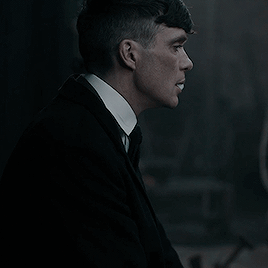
Cheltenham, 1919
With a fake smile on her face, Liv stands next to her host Billy Kimber. Oh, how she hates him. But he was one of her tickets to the big stages and so she has to be friendly with him. The fact that he takes her to the races doesn't bother her at all, because she loves the races. Tommy took her once when they were younger, but this feels like it was in another life. Liv is quite famous now, but since the war is over, it's still hard to get into clubs and perform, which now brings her back here.
"Olivia sweetheart, would you like another glass of champagne?", Kimber asks her and she holds out her glass to him, smiling.
"I'd love some," she says and he fills it up. "Thank you very much," she says politely and then lights a smoke.
Liv has dressed up quite nicely with a cream dress and a silver hair band. She knows that she goes down well with the men and of course takes advantage of it, especially because she has heard that Kimber is a real lecher. She and Kimber are toasting when she is suddenly approached.
"Miss James? Would you mind signing my napkin?" a man asks her and Liv smiles politely.
"But of course not," she replies, standing up and turning her back on Kimber. Just as she finishes, she hears a voice that makes her heart stop. Her back stiffens and she tries to keep her features under control.
"You're really brave Shelby, I'll give you that, or just plain stupid. But I see you brought your pretty barmaid with you. Surely you'll allow me a dance?" asks Kimber and Liv rolls her eyes.
"Of course I won't leave you alone Shelby. I'm sure my date won't mind keeping you company." Suddenly Liv realises that this means her. "Meet…" continues Kimber, grabbing Liv's arm before turning her around. "The delightful Olivia James. I'm sure you've heard of her."
Tommy stares into Liv's eyes, but he doesn't make a face either. As Liv looks into his eyes, she notices that something is different about him. He is no longer the Tommy she said goodbye to at the train station in Birmingham five years ago. Tommy clears his throat briefly and Liv holds out her hand to him, smiling.
"Er of course I've heard of her. I'm honoured," he then says, taking Liv's hand in his and pressing a feather-light kiss to it. Under his touch, Liv shudders. It's amazing that after all these years of not seeing each other, he can still trigger something in her with that little touch.
"Olivia sweetheart, this is Thomas Shelby. He's trying to do business with me…", Kimber says absently and then is already walking towards a young blonde who turns out to be Tommy's escort.
Liv watches them for a moment before deciding to go to the bar. Without paying any attention to Tommy, she orders a gin and lights a new smoke while staring behind the bar. She notices Tommy has moved next to her and is leaning against the bar.
"Liv…" he begins quietly, but she interrupts him immediately.
"What are you doing here Tommy?" she asks, not exactly friendly. Before Tommy can answer, however, she turns to him. "What do you want with Billy Kimber?" she continues, looking into his eyes. Liv notices that any glow has disappeared from them.
"I could ask you the same thing…. It's not like I thought Kimber was your type."
"He isn't. He's… That's not the point right now. I'm working."
"So am I, believe it or not." Liv looks at him again briefly before rolling her eyes and turning back to the bar.
"You do know he's a dangerous man, don't you?" she then asks in a whisper.
"So what? He's not the only one. You just have to take certain risks…"
"Stop it Tommy. Don't be a tough guy here! Not in front of me, you understand?! You're not the only one who's seen the cruel side of war, okay? But that doesn't mean you can put your life on the line so lightly now!" With these words Liv leaves the bar and sits down at the table again.
It's not long before Tommy joins her at the table, but the two don't speak. With an arrogant air, Liv looks around the room, but then Kimber and the other blonde reappear.
"So, now it's time for business," Kimber says, fixing Tommy with his gaze.
"That's our cue," Olivia says kindly, walking up to the blonde, hooking up with her and then leading her away from the table. As they stand at the bar, Liv immediately lets go of her arm. Liv lights a smoke and then looks at the lady.
"What's your name?" she then asks, looking her in the eye.
"Grace."
"Olivia," she returns.
"I know. I like your songs. I saw you in Belfast last year and I loved it."
"Thanks," Liv says, turning to her gin.
"So… You and Mr Shelby… Are you his wife?" asks Liv, trying as hard as she can not to sound jealous.
"Um, no. We're not… involved." A trace of relief spreads through Liv.
"Then I guess he knows Kimber likes you. He's using you…" mumbles Liv to herself, but Grace has heard her and now looks at her questioningly. At that moment, however, Tommy approaches the two of them. He nods his head briefly and looks at Liv.
"Miss James… Mr Kimber would like to speak to you," he says and Liv nods her head with a smile and then disappears with an elegant stride. Tommy, as well as Grace, look after her.
"She's so elegant," Grace slips out and Tommy looks at her.
"On the outside, yes. But believe me, she can be different."
"You know her?" asks Grace, surprised.
"Liv grew up in Small Heath. Along with me and my family, until she decided to move to London." Realisation lights up in Grace's eyes.
"She broke your heart when she left. You were in love with her," she states, hinting at the conversation she and Tommy had at Garrison the other day. Tommy says nothing about it, but then turns back to Grace. He explains to her what the deal with Kimber is, which doesn't exactly thrill Grace, but he doesn't care. He sends Grace ahead with Kimber, which leaves him with Liv.
Liv follows Tommy to his car after clearing up a few more things with Kimber's lawyer. Tommy opens the door for Liv, who gives him an unfriendly look.
"Oi Tommy!", he then hears his brother call after him. He turns and walks towards his two brothers.
"What's wrong?" asks John immediately, sputtering towards the car.
"But that's not Grace…" he observes. Arthur too now looks over at the lady, who is staring stubbornly straight ahead.
"Who's that Tommy?" asks Arthur then and they all three look at Liv.
"Kimber's date…" is all he says and at that moment Liv turns and looks very briefly in the direction of the three men.
"Holy shit! It's Liv!" exclaims John and Arthur also looks at her in surprise.
"Let's just say she looks like Liv. Doesn't feel like it otherwise," Tommy says, lighting a smoke.
"I think she could say the same about us," Arthur mutters and Tommy walks back towards the car. He closes the door behind him and then starts the engine.
The two don't speak on the drive. The landscape passes Liv by and she tries to concentrate on it, but Tommy doesn't make it easy for her. The urge to ask him how he is and how he was able to carry on after the war is in her, but she holds back. Suddenly, at the edge of Kimber's property, Tommy stops.
"What are you doing Tommy?" she asks, looking at him. The Peaky Blinder, however, only looks at her briefly, surprised that her choice of words has changed since earlier, and then stares at the house. "Are you regretting sending her in there already?" asks Liv then smugly.
"Must you Liv?" asks Tommy annoyed as he lights another smoke.
"Must I what? I'm just wondering what you're up to here. Using this young woman for your business." Tommy turns to Liv, grabs her wrist and looks her sternly in the eye.
"You have no idea what this is about Liv, so just stay the fuck out of it eh?" Tommy lets go of her and stares ahead again. Liv rubs her wrist briefly before crossing her arms in front of her chest.
Suddenly Tommy gets out of the car.
"Come on," he prompts Liv and she follows him, rolling her eyes. Tommy hammers impatiently on Kimber's door until it is opened by a servant, but Tommy doesn't even think to wait, but pushes right in and continues walking quickly. The servant doesn't even have time to say anything and looks after Tommy in confusion before turning to Liv.
"Oh, Miss James. Please," he says, ordering her inside. She follows the loud voices coming from the drawing room and then enters as well. Inside, Liv sees Kimber shouting at Tommy, but he tries to explain the situation.
"I offered you a fair trade Shelby! A real star. You've never had anything like this before! And now this?!" exclaims Kimber, beside himself. If he only knew.
"I'm sorry Mr Kimber. I guess I couldn't imagine myself how close Grace is to me. If you don't mind, would we just get on with dinner?" asks Tommy, standing between Grace and Kimber. But Kimber doesn't want to hear any of it, which must be throwing Tommy off a little. Of course, no one would ever notice, but Liv knows Tommy too well. So she walks up to Kimber and massages his shoulders.
"Come on Billy," she whispers in his ear. "Don't be a grump. We'll have a leisurely dinner, then I'll sing for you and then I'll get you the Burrett twins, what do you say?" she purrs and Kimber looks her in the eye. He snorts and then strokes Liv's cheek briefly.
"Very well. You're lucky Shelby that Olivia knows how to calm me down."
Kimber storms out of the room and Liv gives Tommy a jaw-grinding look, but Grace doesn't miss it. She realises there are a lot of unsaid words between them. Then Liv lights a smoke, throws her hair over her shoulders and walks quickly out of the room and into the dining room. Tommy and Grace follow shortly afterwards. As they sit and eat together at the table a little later, Liv sips her wine occasionally. She sits opposite Tommy and she feels his eyes on her again and again.
"So, Olivia… Where are you from? I can't quite place your accent somehow," Grace speaks then, breaking the silence. Liv looks at Tommy for a moment and then smiles artificially at Grace.
"From further north," is all she says. Kimber doesn't need to know where Liv is from exactly. If he finds out Tommy and Liv know each other, he'll think they're working together.
"Where exactly?" continues Grace, and Liv pauses for a moment. "You won't know."
"Let's try," Grace continues, until Tommy intervenes.
"That's enough Grace," he hisses and Kimber seems annoyed.
"What? I'm just asking a normal question." Liv has had enough and she slowly stands up.
"If you'll excuse me for a moment," she says politely and then goes outside to the garden. She lights a smoke and then takes a deep breath.
Shortly afterwards Tommy joins her. "What the fuck, Tommy? Who is this bitch?", Liv then asks, looking at him. "Are you out to hurt me? Is that it? Is it because I hurt you? An eye for an eye?", Liv then asks and now he looks at her too.
"I couldn't care less about you right now Liv," he says and for Liv it's a slap in the face.
She looks Tommy in the eye for a moment longer before turning away from him and walking back into the house. Tears come to Liv's eyes and under no circumstances does she want Tommy to see them. What Liv doesn't know, however, is that the statement is just as painful for Tommy as it is for her. But business comes first now.
#Tommy Shelby x OC#Peaky Blinders#Thomas Shelby x OC#Thomas Shelby#Tommy Shelby#Cillian Murphy#Tommy Shelby x Reader#Peaky Blinders fanfic#Thomas Shelby x Reader
25 notes
·
View notes
Text
Mental Dental
DEMON DENTIST
Belgrade Theatre, Coventry, Wednesday 26th October, 2022
Hot on the heels of Gangsta Granny, Awful Auntie, and Billionaire Boy, comes this latest stage adaptation of a David Walliams novel. Demon Dentist is in similar vein, with all the Roald Dahl-esque features we have come to expect, but with this story there is an extra frisson of horror. Of course, bung ‘dentist’ into the…
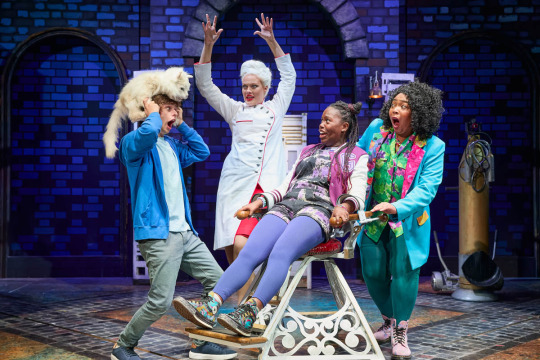
View On WordPress
#Aaron Patel#Belgrade Theatre#Ben Eagle#Birmingham Stage Company#Coventry#David Walliams#Demon Dentist#Emily Harrigan#Georgia Grant-Anderson#James Mitchell#Mia Overfield#Misha Malcolm#Neal Foster#review#Sam Varley#Zain Abrahams
1 note
·
View note
Text
TL;DR: Finally BBC has announced the airing of the recording of The Play What I Wrote on a Sunday evening slot. Date TBA.
BBC announces autumn season of Sunday night performances
Stage shows will be brought to the scheme as part of the autumn season
The BBC has unveiled a season of Sunday night performances and more to be broadcast and released on BBC iPlayer.
Sophie Fiennes will direct a screen version of Ralph Fiennes' Four Quartets, which ran in the West End and on tour last year. The piece sees Fiennes performing T S Elliot's seminal piece live from memory.
The channel will broadcast the RSC and Birmingham Rep adaptation of Tartuffe, which is running at the venue next month, as well as Shakespeare's Globe's production of Twelfth Night with Michelle Terry playing Viola, as well as The Play What I Wrote with Tom Hiddleston.
The series will also see continued episodes of BBC Young Musician, BBC Young Jazz Musician, as well as two productions from award-winning dance company Ballet Black.
The BBC will partner with The Space to create a new production especially for Carlos Acosta's Birmingham Royal Ballet – a new version of Don Quixote.
A new series announced is titled "The Read" – a series of creative performance readings of iconic British novels, directed by exciting emerging talent.
Suzy Klein, head of Arts and Classical Music TV at the BBC said: "We are immensely proud of the Sunday Night Performance programme since its inception in March of this year, and audiences have enjoyed some of very best that Britain's cultural powerhouses have to offer.
"I am delighted to continue to champion and support the performing arts across the UK, and showcase great performances across theatre, classical music, jazz, dance and spoken word, every Sunday night throughout the year. As people across the country face tough choices around their finances, we want to bring them the best of British performance from around the UK - giving audiences the best seat in the house, for free."
Dates for all performances are to be confirmed.
59 notes
·
View notes
Text
Meet Margot (BTS 8th Mmber Profile)
Main M.list 8th Member M.list
Face Claim (This isn’t too important, just so I can put a face to visuals if need be, you can imagine whoever you want!) Twice’s Chaeyoung!

Full Name: Margaret Lia Han
Stage Name: Margot
Position: Singer, dancer, sub rapper
Nicknames: Val, Valentine (because of her birthday)
Born: 14th February 1997 (Valentines baby)
Birthplace: Birmingham, UK
Languages: 1st language English, Korean, Japanese, learning German and French
Instagram: Margot_Polo
Fun facts: She was born in the UK to Korean-English parents, moved to Korea at age 12 to become a trainee with BigHit.
Is an only child.
Her favourite TV show is Brooklyn 99, and she uses it every time she is learning a new language, by having the subtitles in said language.
Hates her birth name, she thinks Margaret makes her sound old so goes exclusively by Margot, apart from by her parents who still call her Margaret. She plans to legally change it at some point in the future.
When she is really upset or stressed, she muddles up her languages. Say she were speaking Korean, she would start to get confused and mix in English.
Absolutely HATES long hair on herself. She thinks that short hair suits her much better, and gives her a better frame for her face. Once, the company forced her to have long hair for the Spring Day music video and promotions, and she had never been more self conscious of herself than in those few weeks.
She is tiny! 5’2
She does call the older boys oppa, but it took quite a while and a bit of convincing from the boys before she was comfortable doing it, since that wasn’t really a think back in the UK.
She has been doing ballet for as long as she can remember, and has taken up learning the aerial hoop in recent years. She hopes that they will be able to incorporate the hoop into their concerts once she gets more skilled at it.
So trying something new! I have some things already planned out for this! Would love to have some requests from your guys for Margot too! Reactions or imagines!
#Bts#8th member#Imagine#Scenario#Drabble#One shot#Smut#Fluff#Angst#Female 8th member#Kim seokjin#Min yoongi#Jung hoseok#Kim namjoon#Park jimin#Kim taehyung#Jeon jungkook#Idol!au#Bts x reader#Reaction
41 notes
·
View notes
Text
Forbidden Desire (Part Seven)
Pairing: Thomas Shelby x Reader (Female/Incestuous)
Warnings: Incest (at this stage accidental), Age Gap, PTSD, Domestic Abuse, Self-Harm, Fluff, Smut
The following day, after you arrived back home late and slept on your sofa, your mother decided to take matters into her own hands. Clearly, you were not going to listen to her and resign from your position at Shelby Company Limited. It was something you had already told her several times that night and she realised again that you were just as stubborn as your father who, unbeknownst to you, was very much alive and familiar to you.
Thus, while you went to work at the gambling den that day, your mother sought out a person who was familiar to her and this person was no other than Polly Grey.
Polly Grey looked after your mother when she was a young teenage girl and ended up in trouble with the authorities for stealing.
Just like the Shelbys back then, your mother was a thief and got involved in minor criminal activities. She got arrested twice and it was Arthur Shelby who threated a police officer on her behalf when he tried to assault her.
Arthur saved her that day and this was how it had all started.
***
“I am here to see Misses Polly Grey” your mother informed Polly’s secretary when she arrived at her office in Birmingham which was located in a much nicer part of town than the gambling den you were working in.
“Do you have an appointment?” the secretary asked but your mother shook her head. Of course she did not have an appointment. In fact, she had not seen Polly since before you were born.
“No, I do not but if you give her my name, I am sure that she will see me” your mother told her and this was exactly what she did. The secretary informed Polly of your mother’s name and, unsurprisingly, Polly called her into her offices right away. She even cancelled one of her other meetings for her, simply to be accommodating for old times’ sake. Polly, of course, was intrigued about what your mother had to say and, yet, nothing would have prepared her for that…that shock…an utter surprise!
***
“I did not expect to see you ever again in this part of the world. You left so suddenly and without a trace” Polly said and your mother was surprised by how well and elegant she looked. She was wealthy and displayed class and maturity, unlike twenty-five years ago when she produced liquor out of her bathroom to make a few quid.
“And I never expected to be back, but here I am, trying to save my daughter from the bad influence of your family” your mother said without any reluctance whatsoever, causing Polly to raise her eyebrows.
“Your daughter is Y/N. I have met her at the gambling den and Thomas, in particular, seems to have taken an interest in her” Polly said almost jokingly before, without asking, pouring your mother a glass of whiskey.
“An interest in her? How?” your mother asked before taking the glass from Polly’s well-manicured hands.
“In the way Thomas takes an interest in anybody. Only he knows. It could be a professional interest or it could be much more than that. I don’t really know. He seems to keep those things from me these days” Polly explained while gesturing for your mother to sit down which, of course, she did in order to be polite.
“He can’t take an interest in her” your mother said nonetheless which, again, caused Polly to chuckle.
“He can’t?” Polly laughed while pouring herself a drink as well. “You would know Thomas well enough to also know that he has no limitations, right? If he likes your daughter then there is nothing I can do about it” Polly then joked before explaining to your mother that the word “can’t” is not part of Tommy’s vocabulary,
“Polly, I am begging you to be reasonable here. I do not want my daughter to be part of this family nor do I want her to be involved with Thomas Shelby in any way whatsoever” your mother said with a less demanding but more desperate tone in her voice.
“She isn’t part of the family. She just part of the business. Despite, she is new and Tommy will get over her within no time, trust me. It is just the way he is these days. I would not think too much of it if I was you” Polly said bluntly.
“Thomas must end her employment and never see her again. I am demanding it! Please! For old times’ sake” your mother said in a begging kind of manner.
“Like I said, Thomas has taken an interest in her for now, so I doubt that he would be amicable to letting her go” polly repeated herself, not knowing why your mother was making such a big deal out of all this. You were grown woman and should be able to decide for yourself as to who you are getting yourself involved with.
“She is not a woman for Thomas Shelby to toy with. There will be consequences if he does” your mother then went on to say, trying to reason with Polly without giving too much away. Although she soon realised that her efforts were futile.
“Being?” Pully asked, intrigued. “Are you going to shoot him?” she then joked and, of course, your mother shook her head.
“No, but Arthur might” she then blurted out, causing Polly to laugh.
“Arthur?” she asked. “And why would he do that?” she wondered.
“Because Y/N is his daughter. Isn’t that obvious to you?” your mother responded almost hysterically, causing Polly’s chin to drop. She knew that there was something about you which intrigued her and made her feel as though she knew you somehow or from somewhere, but she could never really figure out why she had this somewhat strange feeling about you. Now, it all made sense to her and she was shocked.
“I never told anyone until now because I am ashamed of ever having been involved with this family. I was young and naïve when I fell in love with Arthur and I certainly do not want my daughter to become a part of any criminal activities. I am begging you Polly, from mother to mother, get her out of this company” your mother then went on to say before Polly could even digest the news.
“That explains everything. Y/N is a Shelby woman” Polly said. She was stunned and got up from where she was sitting in order to walk around, thinking about what to do next.
“No. She will never be a Shelby woman” your mother blurted out, invading Polly’s thoughts about how to approach these news with both Arthur and Tommy.
“Unfortunatly that is not up to you to decide. It is Y/N’s decision alone. If she wants to be a part of this family, then by all means, she can…” Polly argued while still thinking about it some more. “Of course, Tommy will keep her out of the sport if she is a Shelby and, of course, she will be under the protection of the Peaky Blinders so, really, there is nothing for you to worry about, is there?” Polly then went on to say while grabbing her coat and telling your mother that she had more urgent business to attend to.
She had to find Arthur and she most certainly had to find Tommy before he was to do something stupid.
At the same time…
Just as your mother went to see Polly at her offices at around ten o’clock, you went into work at the gambling den and were greeted by Linda who appeared to be upset by something Lizzie had done.
According to her, it was Lizzie who took the missing money from safe simply to play tricks on you and even Linda herself was outraged by this.
“I can’t believe it. This is so dishonest of her” she said and it took you a while to comprehend what she was saying.
“So, Lizzie took the money and wanted me to take the fall for it? Is that it?” you asked, causing Linda to nod.
“Yes. She thinks that you are seeing Tommy which, I know, is quite outrageous” Linda laughed. “I know you like him, this much is obvious to me, but as if he would be interested in sleeping with someone like you. It’s absurd and I told Lizzie so many times that she had nothing to worry about…” she went on to say, causing you to fume with anger.
“Right. Listen Linda, I am not feeling well today so I will be taking the day off” you said calmly, supressing the anger you felt towards her.
“You will what now?” Linda asked. She was surprised by your audacity to leave her with all the work that had to be done and snapped. “You can’t just leave. I am on my own here” she spat.
“Watch me. I can. I will see you tomorrow” you said as you waived her goodbye whereas, the truth was, that you did not feel unwell at all.
You felt anger towards her, yes, but, after comment, you also suddenly felt an urgent need to continue where you had left off last night when you visited Tommy.
For some reason, Linda’s comment triggered something inside of you and you felt as though you needed to prove something to yourself and this exactly why, for the next two hours, you spent all of your money to buy yourself something nice before, finally, returning to Arrow House to claim what you ought was yours.
To be continued…
Please comment and engage. I love getting comments and predictions pretty please!
Tag List
@fastfan
@elenavampire21
@dolllol2405
@allie131313
@cilliansangel
@coldbastille
@kpopgirlbtssvt
@cdej6
@kathrinemelissa
@landlockedmermaid77
@crazymar15
@damedomino
@lauren-raines-x
@miss-bunny19
@skinny-bitch-juice
@odorinana
@cloudofdisney
@weepingstudentfishhorse
@allexiiisss
@geminiwolves
@letsstarsfalling
@ysmmsy
@chlorrox
@tommyshelbypb
@chocolatehalo
@music-lover911
@desperate-and-broken
@mysticaldeanvoidhorse
@peaky-cillian
@lelestrangerandunusualdeetz
@december16-1991
@captivatedbycillianmurphy
@romanogersendgame
@randomfangirl2718
@missymurphy1985
@peakyscillian
@lilymurphy03
@deefigs
@theflamecrystal
@livinginfantaxy
@rosey1981
@hanster1998
@fairypitou
@zozeebo
@kasaikawa
@littleweirdoalien
@sad-huffle-nerd
@theflamecrystal
@0ghostwriter0
@stylescanbeatmyback
@1-800-peakyblinders
@datewithgianni
@momoneymolife
@mcntsee
@janelongxox
@basiclassy
@being-worthy
@chaotic-bean-of-smolness
@margoo0
@vhscillian
@crazymar15
@im-constantly-fangirling
@namelesslosers
@littlewhiterose
@ttzamara
@cilleveryone
@peaky-cillian
@severewobblerlightdragon
@dolllol2405
@pkab
@babaohhhriley
@littleweirdoalien
@alreadybroken-ts
@masteroperator
@stevie75
@shabzy96
@rainbow12346
@obsessedwithfandomsx
@geeksareunique
@laysalespoir
@paigem00
@lkarls
@vamp-army
@luckystarme
@myjumper
@gxorg
@eline-1806
@goldenharrysworld
@cristinagronk16
@stylesofloki
@faatxma
@slut-for-matt-murdock
@tpwkstiles
@myjumper
@cloudofdisney
@look-at-the-soul
@smellyzcat
@kittycatcait219
@theliterarybeldam
@being-worthy
@layazul
@lyn07
@kagilmore
@50svibes
@mainstreetlilly
@ourthatgirlabby
@bitchwhytho
@takethee
@registerednursejackie
@sofi128
@mrkdvidal1989
@minxsblog
@heidimoreton
@laylasbunbunny
@laylasbunbunny
@queenshelby
@camilleholland89
@forgottenpeakywriter
@vintagecherryt
@indierockgirrl
@mrkdvidal1989
@bluesongbird
@dudde-44
@gasolinesavages
@kissforvoid
@bluebird592
@1eugenia1isabella1
@esposadomdp
@lulunalua23
@lovelace42
@bookklover23
@iwantmyredvelvetcupcake
@moonmaiden1996
@marlenamallowan
@cyphah (cannot tag)
@majesticcmey
@cleverzonkwombatsludge
@throughgoeshamilton
@alessioayla
@elenavampire21
@justforfiction
@cilliansangel
@alannielaraye
@satellitelh
@pandoramyst
@duckybird101
@snixx2088
@kylianswag
@alessioayla
@pono-pura-vida
@iraisbored69
@howling-wolf97
@aesthetic0cherryblossom
@weirdo-rules
@lovemissyhoneybee
@dazaiscum
@esposadomd
@etherealkistar
@ur--mommy
@throughgoeshamilton
@celverzonkwombatsludge
@cyphah
@atomicsouldcollecto
#Tommy Shelby#thomas shelby#Peaky Blinders#peaky blinder#cillian murphy#tommy shelby fanfiction#tommy shelby imagine#tommy shelby smut#tommy shelby x reader#thomas shelby fanfic#thomas shelby x reader#thomas shelby imagine#thomas shelby x you#thomas shelby x y/n#tommy shelby x you#peaky blinders fanfiction#peaky blinders fanfic#peaky blinders imagine'#peaky blinders imagine#polly gray#polly grey#Arthur Shelby#cillian murphy fanfic#cillian murphy x you
258 notes
·
View notes
Text

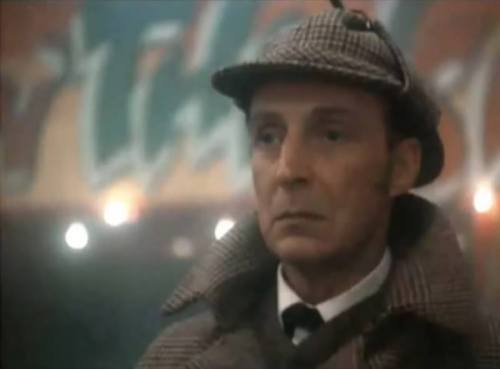
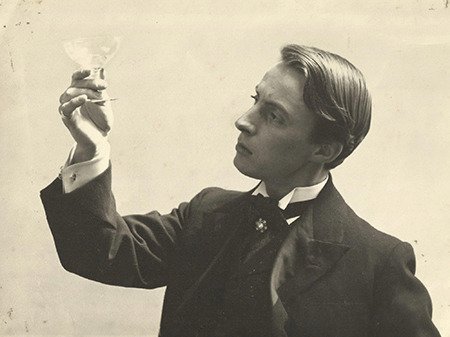
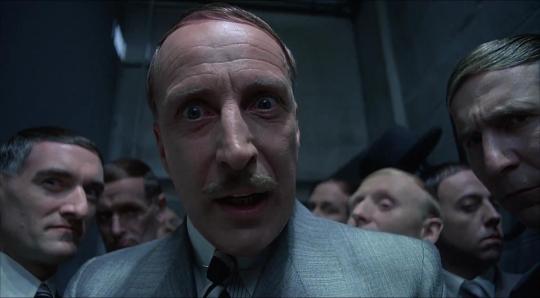
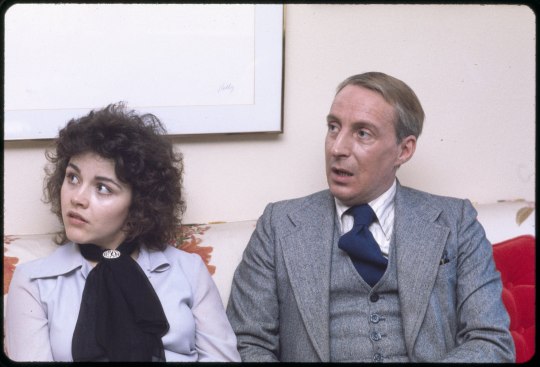


On February 9th 2007 the Scottish actor Ian Richardson passed away.
Ian is probably most famous for the TV series House of Cards. Ian was educated in Edinburgh, at Balgreen Primary School, Tynecastle High School and George Heriot’s School. He made his stage debut as 14 year old in, A Tale of Two Cities and caught the acting bug, and unfortunately, in my own opinion, the directed told him he would need to lose his Scottish accent to progress as an actor. Nowadays actors seem to adapt their accents to each role, it’s a pity Ian was told this and I wonder was it that rough it had to happen?
His mother arranged elocution lessons, and he became a stage manager with the semi-professional Edinburgh People’s Theatre. made a name for himself playing Hamlet at the Birmingham Repertory Theatre in 1960 before joining the Royal Shakespeare Company where he began a stint of several years appearing in a variety of roles. At the RSC, he created the role of Jean Paul Marat in Marat/Sade, reprising it for the much-heralded 1966 film version. Stage success in Stratford, Ontario, and New York would soon follow.
Richardson appeared as Oberon in Peter Hall’s well-liked 1968 rendition of A Midsummer Night’s Dream, then as Don John in the BBC Much Ado About Nothing in 1978. Much of his best work has been on TV, the silkiness of his delivery equipping him equally for traitors like the mole who sells out in Tinker, Tailor, Soldier, Spy or, eponymous, Blunt , or as a speaker of Six Centuries of Verse.His portrayal in the former role of Bill Haydon in the adaptation of John Le Carres novel was exquisite and would reward a watching. He also starred as Sherlock Holmes in two TV movies Hound of the Baskervilles and Sign of Four before starring in the dystopian universe of Terry Gilliam’s Brazil . For the rest of the 1980’s there were a variety of character roles in both films and TV.
The 72-year-old actor died unexpectedly in his sleep at his London house on February 9, 2007, survived by his widow Maroussia Frank, whom he died in the arms of, the couple had been making plans for their 46th wedding anniversary……
8 notes
·
View notes